

Best time travel questions
Home » Questions » Best time travel questions
Time travel has been a fascinating concept for centuries, captivating the minds of both scientists and enthusiasts alike. The idea of being able to travel to the past or future has sparked numerous debates and theories. As a result, a multitude of questions have arisen regarding the possibilities and consequences of time travel. In this article, we will explore some of the most thought-provoking time travel questions that have intrigued people throughout history.
See these time travel questions
- Is time travel possible?
- What are the different theories of time travel?
- If time travel is possible, can we change the past?
- Would time travel lead to alternate timelines?
- What are the implications of meeting your past self?
- How would time travel affect historical events?
- Could time travel be used to prevent disasters?
- What would happen if someone killed their own grandparent in the past?
- Would time travelers be able to interact with people from the past?
- What would be the consequences of altering the future through time travel?
- Can time travelers bring objects from the future to the present?
- Would time travel create paradoxes?
- What would happen if someone met their future self?
- Could time travel be used to gain an unfair advantage?
- How would time travel affect the flow of time?
- Can time travel be used for scientific research?
- Would time travelers age differently?
- What would be the ethical implications of time travel?
- Could time travel explain unexplained historical events?
- How would time travel affect the stock market?
- Can time travelers change their own personal history?
- Would time travel be accessible to everyone?
- What would happen if someone got stuck in the past or future?
- Could time travel help solve mysteries?
- Would time travelers be able to predict the future?
- How would time travel affect the concept of free will?
- What would be the psychological effects of time travel?
- Can time travel be used for educational purposes?
- Would time travelers be able to alter their own memories?
- What would happen if someone met a future version of themselves?
- Could time travel be used to explore other dimensions?
- How would time travel affect the aging process?
- Can time travelers change their own past decisions?
- Would time travel be regulated by the government?
- What would happen if someone tampered with historical artifacts?
- Could time travel be used to solve crimes?
- How would time travel affect the concept of identity?
- Can time travelers prevent their own birth?
- Would time travel result in a fixed timeline or a flexible one?
- What would happen if someone revealed future knowledge to people in the past?
- Could time travelers visit other planets or galaxies?
- How would time travel affect the concept of causality?
- Can time travel be used to explore the origins of the universe?
- Would time travelers be able to communicate with future civilizations?
These questions merely scratch the surface of the intriguing topic of time travel. While we may never have definitive answers to these inquiries, the exploration and contemplation of such possibilities continue to captivate our imaginations. Time travel remains a captivating concept that fuels our curiosity and pushes the boundaries of our understanding of the universe.
Related Post:

Leave a Comment Cancel reply
Save my name, email, and website in this browser for the next time I comment.
Best tribe of mentors questions
Best slave submission quotes
Best triangle questions
Best slave punishment quotes
Best trial questions
Best slap shot quotes

© the narratologist 2024
A beginner's guide to time travel
Learn exactly how Einstein's theory of relativity works, and discover how there's nothing in science that says time travel is impossible.
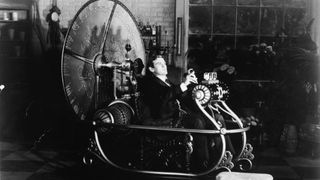
Everyone can travel in time . You do it whether you want to or not, at a steady rate of one second per second. You may think there's no similarity to traveling in one of the three spatial dimensions at, say, one foot per second. But according to Einstein 's theory of relativity , we live in a four-dimensional continuum — space-time — in which space and time are interchangeable.
Einstein found that the faster you move through space, the slower you move through time — you age more slowly, in other words. One of the key ideas in relativity is that nothing can travel faster than the speed of light — about 186,000 miles per second (300,000 kilometers per second), or one light-year per year). But you can get very close to it. If a spaceship were to fly at 99% of the speed of light, you'd see it travel a light-year of distance in just over a year of time.
That's obvious enough, but now comes the weird part. For astronauts onboard that spaceship, the journey would take a mere seven weeks. It's a consequence of relativity called time dilation , and in effect, it means the astronauts have jumped about 10 months into the future.
Traveling at high speed isn't the only way to produce time dilation. Einstein showed that gravitational fields produce a similar effect — even the relatively weak field here on the surface of Earth . We don't notice it, because we spend all our lives here, but more than 12,400 miles (20,000 kilometers) higher up gravity is measurably weaker— and time passes more quickly, by about 45 microseconds per day. That's more significant than you might think, because it's the altitude at which GPS satellites orbit Earth, and their clocks need to be precisely synchronized with ground-based ones for the system to work properly.
The satellites have to compensate for time dilation effects due both to their higher altitude and their faster speed. So whenever you use the GPS feature on your smartphone or your car's satnav, there's a tiny element of time travel involved. You and the satellites are traveling into the future at very slightly different rates.

But for more dramatic effects, we need to look at much stronger gravitational fields, such as those around black holes , which can distort space-time so much that it folds back on itself. The result is a so-called wormhole, a concept that's familiar from sci-fi movies, but actually originates in Einstein's theory of relativity. In effect, a wormhole is a shortcut from one point in space-time to another. You enter one black hole, and emerge from another one somewhere else. Unfortunately, it's not as practical a means of transport as Hollywood makes it look. That's because the black hole's gravity would tear you to pieces as you approached it, but it really is possible in theory. And because we're talking about space-time, not just space, the wormhole's exit could be at an earlier time than its entrance; that means you would end up in the past rather than the future.
Trajectories in space-time that loop back into the past are given the technical name "closed timelike curves." If you search through serious academic journals, you'll find plenty of references to them — far more than you'll find to "time travel." But in effect, that's exactly what closed timelike curves are all about — time travel

This article is brought to you by How It Works .
How It Works is the action-packed magazine that's bursting with exciting information about the latest advances in science and technology, featuring everything you need to know about how the world around you — and the universe — works.
There's another way to produce a closed timelike curve that doesn't involve anything quite so exotic as a black hole or wormhole: You just need a simple rotating cylinder made of super-dense material. This so-called Tipler cylinder is the closest that real-world physics can get to an actual, genuine time machine. But it will likely never be built in the real world, so like a wormhole, it's more of an academic curiosity than a viable engineering design.
Yet as far-fetched as these things are in practical terms, there's no fundamental scientific reason — that we currently know of — that says they are impossible. That's a thought-provoking situation, because as the physicist Michio Kaku is fond of saying, "Everything not forbidden is compulsory" (borrowed from T.H. White's novel, "The Once And Future King"). He doesn't mean time travel has to happen everywhere all the time, but Kaku is suggesting that the universe is so vast it ought to happen somewhere at least occasionally. Maybe some super-advanced civilization in another galaxy knows how to build a working time machine, or perhaps closed timelike curves can even occur naturally under certain rare conditions.

This raises problems of a different kind — not in science or engineering, but in basic logic. If time travel is allowed by the laws of physics, then it's possible to envision a whole range of paradoxical scenarios . Some of these appear so illogical that it's difficult to imagine that they could ever occur. But if they can't, what's stopping them?
Thoughts like these prompted Stephen Hawking , who was always skeptical about the idea of time travel into the past, to come up with his "chronology protection conjecture" — the notion that some as-yet-unknown law of physics prevents closed timelike curves from happening. But that conjecture is only an educated guess, and until it is supported by hard evidence, we can come to only one conclusion: Time travel is possible.
A party for time travelers
Hawking was skeptical about the feasibility of time travel into the past, not because he had disproved it, but because he was bothered by the logical paradoxes it created. In his chronology protection conjecture, he surmised that physicists would eventually discover a flaw in the theory of closed timelike curves that made them impossible.
In 2009, he came up with an amusing way to test this conjecture. Hawking held a champagne party (shown in his Discovery Channel program), but he only advertised it after it had happened. His reasoning was that, if time machines eventually become practical, someone in the future might read about the party and travel back to attend it. But no one did — Hawking sat through the whole evening on his own. This doesn't prove time travel is impossible, but it does suggest that it never becomes a commonplace occurrence here on Earth.
The arrow of time
One of the distinctive things about time is that it has a direction — from past to future. A cup of hot coffee left at room temperature always cools down; it never heats up. Your cellphone loses battery charge when you use it; it never gains charge. These are examples of entropy , essentially a measure of the amount of "useless" as opposed to "useful" energy. The entropy of a closed system always increases, and it's the key factor determining the arrow of time.
It turns out that entropy is the only thing that makes a distinction between past and future. In other branches of physics, like relativity or quantum theory, time doesn't have a preferred direction. No one knows where time's arrow comes from. It may be that it only applies to large, complex systems, in which case subatomic particles may not experience the arrow of time.
Time travel paradox
If it's possible to travel back into the past — even theoretically — it raises a number of brain-twisting paradoxes — such as the grandfather paradox — that even scientists and philosophers find extremely perplexing.
Killing Hitler
A time traveler might decide to go back and kill him in his infancy. If they succeeded, future history books wouldn't even mention Hitler — so what motivation would the time traveler have for going back in time and killing him?
Killing your grandfather
Instead of killing a young Hitler, you might, by accident, kill one of your own ancestors when they were very young. But then you would never be born, so you couldn't travel back in time to kill them, so you would be born after all, and so on …
A closed loop
Suppose the plans for a time machine suddenly appear from thin air on your desk. You spend a few days building it, then use it to send the plans back to your earlier self. But where did those plans originate? Nowhere — they are just looping round and round in time.
Sign up for the Live Science daily newsletter now
Get the world’s most fascinating discoveries delivered straight to your inbox.

How It Works has a special formula for making learning fun by answering questions on science, space, history, technology, transport and the environment with engaging articles, in-depth special features, global science news, and topical interviews. With impressive cutaway illustrations that show how things function, and mindblowing photography of the planet’s most inspiring spectacles, How It Works represents the pinnacle of engaging, factual fun for a mainstream audience keen to keep up with the latest tech and the most impressive phenomena on the planet and beyond. Written and presented in a style that makes even the most complex subjects interesting and easy to understand, How It Works is enjoyed by readers of all ages.
Get fantastic offers by subscribing to the digital and/or print edition now. Subscribers get 13 issues per year!
James Webb telescope's 'shocking' discovery may hint at hidden exomoon around 'failed star'
NASA reveals 'glass-smooth lake of cooling lava' on surface of Jupiter's moon Io
Haunting photo of Earth and moon snapped by China's experimental lunar satellites
Most Popular
- 2 Giant, 82-foot lizard fish discovered on UK beach could be largest marine reptile ever found
- 3 Nightmare fish may explain how our 'fight or flight' response evolved
- 4 Lyrid meteor shower 2024: How to watch stunning shooting stars and 'fireballs' during the event's peak this week
- 5 Why do cats' claws retract but dogs' claws don't?
- 2 'Uncharted territory': El Niño to flip to La Niña in what could be the hottest year on record
- 3 Rare 'porcelain gallbladder' found in 100-year-old unmarked grave at Mississippi mental asylum cemetery
- 4 NASA reveals 'glass-smooth lake of cooling lava' on surface of Jupiter's moon Io
- 5 'We were in disbelief': Antarctica is behaving in a way we've never seen before. Can it recover?

Time Travel ESL Speaking Questions
B1 and B2 Level Speaking – Time Travel ESL Speaking

- Have you seen any time traveling movies? Suggestions: The Girl Who Leapt Through Time – Anime, Back to the future, Edge of tomorrow, Bill and Ted’s Excellent Adventure
- Do you think that people will achieve time travel in the future? Why? / Why not?
- How would they do it? (Use machine/Travel with their mind and possess someone from that time/Use a gadget)
- In which year? Why?
- What would be like? Paint me a picture.
- How would it be different from the present?
- What would you do?
- If you could stop time, what would you do and why?
In the Future:
- How far into the future would you like to travel? In which year?
- What do you hope to see?
- Why / Why not?
- What if your life depended on it?
In the Past:
- In which year?
- What would you ask this person?
- How would you spend the time with this person?
- On your time travels, you can take five objects to show people what life is like towards the end of the 20th century. What five objects would you take? Why?
- What would you ask him/her?
Share this page
Language Skills
Educational books, more articles:.

My Hometown – B1 Level ESL Speaking
ESL Conversation Questions about your hometown Hometown – B1 Level ESL 23 questions to discuss with your teacher or partner about your hometown. What is

Helping People – ESL Conversation
Helping People – Conversation B2 – C1 Level Helping People. Below you will find four stories. Read the stories and then decide how you are
- International edition
- Australia edition
- Europe edition
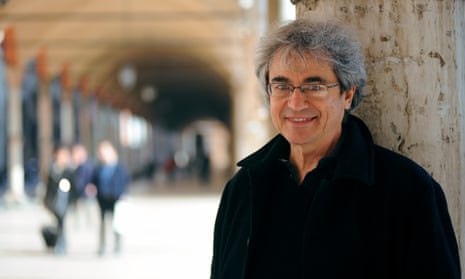
Carlo Rovelli: ‘Time travel is just what we do every day…’
What do you ask the man who knows everything? The theoretical physicist and bestselling author answers questions from famous fans and Observer readers
T heoretical physicists and mathematicians are fond of describing their theories and equations as beautiful but very few writers are able to bring this elegance to life for the general public. The Italian physicist Carlo Rovelli has proved himself to be one of those rare figures. His first attempt at writing a book for a mainstream audience, Seven Brief Lessons on Physics (2014), outsold Fifty Shades of Grey in his home country, has been translated into 41 languages and sold more than 1m copies. His second, The Order of Time , is an appreciation and lucid deconstruction of a quality we take for granted – “We inhabit time as fish live in water,” he writes.
Like other popular scientists such as Stephen Hawking, Carl Sagan and Brian Cox, Rovelli feeds our fascination with the fundamental forces that make our universe tick. Here, famous fans and Observer readers question him further.
Questions from famous fans
Can you imagine a future in which relativity and quantum mechanics could be so well and generally understood that time, as mediated by relative motion and the strength of the local gravitational field, becomes part of our immediate and common sense appreciation of the world? Could we experience in the every day space and time obviously and sensuously inseparable? Or are we bound by our very nature and our evolutionary past, and living between the very large and very small, to remain within the sensory limits we experience now? I think that we will learn, and slowly counterintuitive ideas will become intuitive. It has happened with the fact that the Earth is a sphere (clarified two millennia ago) and the fact that it spins (clarified a few centuries ago). At first these were extremely counterintuitive ideas; nowadays we accept them as comprehensible. But it takes time. I think, for instance, that the day when we will have spaceships travelling very fast, and we experience directly things like meeting our children older than us on our return home… when we experience this, the elasticity of time will become obvious to us. Of course, all this is assuming our civilisation survives long enough and we do not destroy ourselves with conflicts and stupidity, which is something we humans seem to be very good at and not ready to move away from.
Artist and designer known for her kinetic stage sculptures

The course of events often feels cyclical; in architecture, design and fashion, styles and tendencies seem to echo and recur . Could there be folds in the fabric of time that wrap around and touch one another, causing imprints and echoes? Oh, Es! If your extraordinarily creative artist’s mind can make something out of these folds, wraps, imprints and echoes, I am the last one willing to tune this idea down! The fabric of time is multilayered, stratified; this is precisely the main idea of my last book. At some level, my answer would probably be negative, but at another level – the one woven by the memories and expectations of our brain – the answer is certainly yes; this is the level we actually mean, when we concretely think about what time is for us.
How, if at all, has music helped you on your path of knowledge and understanding about the way things work? I do not know. Like most people, I listen to a lot of music and in writing my book on time I have thought much about the relation between music and our sense of time flow. The fact that so much meaning is conveyed in such an apparently meaningless structure as a sequence of sounds has always mystified me.
Comedian and co-host of The Infinite Monkey Cage
Does dealing with the reality of atomic and subatomic behaviour help take your mind off the surrealism of human political behaviour in these strange times? I do not think that these times are particularly strange. Humans have massacred one another and had a hard time collaborating for ever. What changes is who the [short-term] winners are. As for me, no, dealing with physics does not help in taking my mind off humans’ continuous self-inflicted pain.
James Lovelock
Scientist best known for proposing the Gaia hypothesis
What is the best way to view time? What we call time, and usually view as a very simple elementary notion, is actually a complex experience grounded on different levels. There is a basic physical level of “things happening”, but this is very far from our common notion of time, because it lacks all the rich features of what we call time. Then there are approximations due to our specific scale. There is the effect of the large number (myriads) of microscopic degrees of freedom we interact with. There is the very peculiar manner in which our brains interact with the world, based on memory and tentative anticipation of the future.
Finally, there is a thick emotional layer, which is what gives us the sense of the “flow” of time. The problem of understanding time is the problem of disentangling this complex tangle of structures and effects. Your wonderful realisation of the notion of Gaia was based on viewing unity beyond apparent complexity. Understanding time is the opposite: viewing the complexity beyond apparent unity.

Nick Hornby
I loved The Order of Time . It made my head spin, while your writing is clear and beautiful. However, I have decided to ignore you and I am going to think about time the old-fashioned way for the rest of my life – in a line, with a now, a yesterday and a next year. To think of it in terms of kisses and crowds of Italians jostling is too disorienting. What am I missing out on? If you prefer to keep thinking about time in the old-fashioned way, what you are missing out on is a lot of fun and an opportunity to learn more in depth about how the universe really works. Not much more than this. I think one can happily keep living thinking that the Earth is flat or is at the centre of the universe; in daily life, it does not matter much, if at all. And of course I understand that crowds of Italians jostling is disorienting; but still, do you really feel that a world made of stone is more hospitable than a world made of kisses?
Hans Ulrich Obrist
Artistic director of the Serpentine Galler ies , London
I am curious to know more about your unrealised projects. We know a lot about architects’ unrealised projects as they publish them, but we don’t know much about those of artists and scientists , which is why I’m mapping them. What is your dream? I think most scientists have unrealised projects. My drawers are full of unfinished works. My dream project is between physics and biology. There is a common idea that a living organism is a sort of fight against entropy: it keeps entropy locally low. I think that this common idea is wrong and misleading. Rather, a living organism is a place where entropy grows particularly fast, like a burning fire. Life is a channel for entropy to grow, not a way to keep it low. My dream is to be able to articulate this properly and quantitatively. I do not know if I will ever be able to. I have to study.
Monica Grady
Space scientist
In The Order of Time , you write: “ The characteristic features of time have proved to be approximations, mistakes determined by our perspective…” How does this affect your ability to read a bus timetable and get to an appointment on time? Not at all, of course. Does knowing that in Sydney people live upside down make it harder for you to distinguish the floor from the ceiling? Realising that we use approximate concepts, and that it is a mistake to assume that they have universal validity, does not prevent us from using them. If anything, we understand them better, because we now know the limits of their validity.

Michael Pollan
Author and activist
I have three questions: do you think that quantum mechanics has any relevance for our understanding of consciousness? Do the quantum effects observed at the level of particles scale up to our experience of the world or do the effects wash out as you move up? Finally, y ou have said that your youthful experience of psychedelics opened you up to the non intuitive ideas of theoretical physics. What specifically happened during those trips to change your mind? I do not think that quantum theory plays any major role in our understanding of consciousness. However, I suspect that perhaps better understanding quantum theory could free us from some prejudices about the structure of reality, prejudices that obstruct us in [our] understanding of what consciousness is, whatever that word means. Quantum theory indicates that reality is more interdependent than it is in the picture classical physics paints.
The reason I think that quantum effects are more or less irrelevant for consciousness is precisely because they do not scale up to our experience of the world; they wash out as we move up in dimension. This is why the world looks so “non-quantum” to us, well described by classical mechanics.
Your question about my experience of psychedelics and its relation to the nonintuitive ideas of theoretical physics is delicate. Let me put it this way: I got so confused about the basic structure of reality that when, 10 years later, I had to dive into fundamental theoretical physics, I wasn’t scared of losing my bearings. You ask what specifically happened during those trips. The psychedelic experience is notoriously very strong and at the same time very hard to talk about. A drastic loss of the usual personal, emotional and intellectual coordinates. Overwhelming emotions, a sudden sense of seeing everything profoundly differently. The colourful visual theatre is nice and fun, but less important, at the end. In the days after my first experience, I wrote frenetically in a notebook about it. I filled an entire notebook. A few months later, my mother found the notebook and burned it.
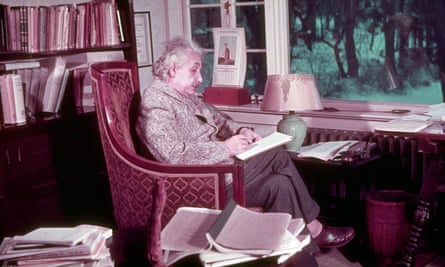
Neil G aiman
‘ ‘ I’m haunted by the idea of Einstein telling a colleague that his dead wife was still alive and it is merely a failure in our perception to see all of time as existing at once. (I may have completely misunderstood what you and/or he were saying.) So are we flatlanders, failing to perceive a much richer universe around us, deluded by the idea of sequential time? You haven’t misunderstood. We are flatlanders, failing to perceive a much richer universe around us, deluded by the idea of sequential time. But perhaps not in the simple-minded sense of our loved ones still being alive… The reason for the failure of our perception to see all of time as existing at once is deeply grounded in the physics of our environment and ourselves, but we still have the intelligence and imagination to allow us to see beyond those limits. And to imagine plural worlds, as you know well, I would say…
Helen Czerski
Physicist, broadcaster and writer
Time and gravity are grand concepts that can seem very remote from the practicalities of being human. What are the small things in life that bring you joy and what are your favourite ways to spend time with friends and family? Do you separate the small joys and the grand thoughts or are they all woven together? I think that they are pretty much woven together, because I have difficulty compartmentalising my life. The small things that bring me joy are things like waking up in the morning and going out to watch the sea (I live near the sea) or just doing nothing with my companion. I like a lot hiking and travelling. I have a small, very old boat and as soon as I can, I just go out to sea, maybe even to eat bread and cheese while the sun sets.
Jim Al-Khalili
Theoretical physicist and host of Radio 4’s The Life Scientific
Despite all its success as a beautiful theory of the building blocks of the universe, quantum mechanics still leaves even those of us physicists who work with it daily both frustrated and bemused. Would you agree that maybe Einstein was right after all and that quantum mechanics is not yet complete? Yes, I agree that maybe quantum theory is incomplete. Because how could we ever be sure that anything is “complete”? But only “maybe”, because I do not see compelling reasons to conclude that quantum theory can only be viewed as an incomplete theory. The reason is that any possible “completion” of quantum theory demands that we accept strangenesses that are even less plausible than those implied by quantum theory as it is. With the difference that the strangenesses of quantum theory as it is are empirically confirmed, while the strangenesses of its completion are arbitrary guesses. I think that quantum theory can make sense as it is: we just have to give up some cherished metaphysical prejudices and accept the deep relational aspect of nature that the success of the theory has revealed.

Questions from readers
I read recently that you take enormous pleasure in washing up piles of dishes. Why is this? And any tips for removing stubborn stains from pans? What other household chores do you enjoy? Jane via email
I have no special tips. In fact, I do not think I am particularly good or effective at washing dishes. I just like doing it. The reason is that it is one of those (rare) human activities where you start with a disgusting mess, you immerse yourself in an easy task that relaxes your mind and you end up with everything nice and clean and shining and neat. Wouldn’t it be great if life was all like that? Usually, it is the opposite: you start with something so-so, you struggle and get nervous and at the end it is all a mess. My habit of cleaning dishes comes from my youth when I used to live with messy friends. Nobody ever wanted to do the dishes and cohabitation tended to raise tensions. I discovered that if I did the dishes for everybody then everybody loved me and living together became a pleasure. So I got a lot for a cheap price. In fact, in exchange, my room-mates routinely did the groceries and cooked wonderfully for me. Definitely worthwhile.
Do you believe in free will? Celso Antonio via Twitter
Free will is an ambiguous expression. In the commonsense meaning of “being free to decide”, of course there is free will: we decide. If, instead, by free will you mean that in deciding we violate known laws of physics and their standard causal relations, then no, there is no free will in this sense; the evidence is now overwhelming. What happens in a “decision” is a very complex network of microevents in the brain, which is too complicated to predict. As clarified by Spinoza, free will is real: it is the name we give to our own inner complexity, which is too rich for us to disentangle or predict.
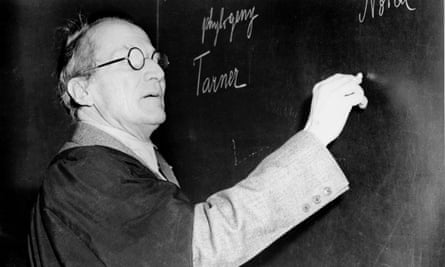
Is [Schrödinger’s] goddamn cat dead or not? Afristotle via Twitter
I think the cat is never “dead and also alive”, as quantum theory is sometimes said to claim. The cat is either dead or alive. The subtle point, in my opinion, is that all contingent aspects of reality are relative to other physical systems and are realised in interactions. Therefore in principle a cat could be neither dead nor alive as long as it was not interacting with anything. But a macroscopic entity such as a cat is constantly interacting heavily with the rest of the world – therefore it is effectively always either alive or dead. Cats behave. The discussion on the interpretation of quantum theory is wide open, however. I think that different perspectives are possible. It may be a mistake to pretend to choose one. Maybe the different readings of quantum theory that are discussed are all interesting and the future will tell us better.
Is there a layman’s way of explaining how gravity alters time, please? Sea -level and up -a -mountain kind of gravity … HarvestingKarma via comment
The straight way of thinking is the opposite: it is not gravity that alters time, rather, it is the alteration of time that is responsible for gravity. The point is that a large mass like the Earth slows down time in its vicinity (please do not ask why, because I can only answer one question at a time). And the effect of this slowing down of time in the vicinity of the Earth is that things fall. A bit like when you run into the sea and your feet are slowed down by the water and your body is pulled downwards…

Is a new, more powerful linear [circular] collider than the LHC really worth it at the moment, given that the glory years of discovering new elementary particles appear to have ground to a halt ? bilyou via comment
This is a large and serious discussion, going on currently in the scientific community. There are good arguments on both sides. It is never easy to decide where best to allocate resources. Part of the scientific community is digesting the disappointment of not having found at LHC what they were convinced had to be there. For others, such a non-discovery has actually been a confirmation of expectations. It is good to stop and think sometimes.
How seriously should we be taking the recently mooted idea that the universe is a form of hologram? What difference would it make to doing science? To living life? palfreyman via comment
I have never been convinced by this vague idea. If there is something to it, I have not yet seen it realised in a convincing way as a theory of our world. On the other hand, I have seen a lot of very free speculations in this direction, which I do not find very plausible. I might be wrong, of course. Others disagree.
Can time be said to exist if no observer/participant is there to experience it? How would one know? Could this not make consciousness a fundamental quality of the universe? Gary W Kelly, Salinas, California
I definitely don’t think consciousness is a fundamental quality of the universe. Our subjective conscious experience is the product of the complexity of our brain: it is something very specific. The universe is not going to change whether we experience it or not. It is out there and it does what it does. This is what we learn when we are three years old and it’s true. What depends on our consciousness is the way we ourselves perceive time – our experiential time. Discovering that something we perceive depends on the way we are does not imply that the universe depends on us.

Do you think that Richard Feynman ’s dictum “Shut up and calculate” has done a great disservice to physics? Isn’t physics about trying to understand the root causes behind physical phenomena, not just treating them as “black boxes” we can never hope to comprehend? David Mitchell via comment
I think the dictum “Shut up and calculate” is misattributed to Feynman. Feynman was a deep thinker, asking subtle and fundamental questions and offering visual interpretation of his calculations: quite the opposite of “Shut up and calculate”. The expression “Shut up and calculate” has been used to characterise a certain excessive pragmatism in the physics of the 1950s. I believe we have moved out of it. Of course science is about understanding, not about predicting.
Is time travel a possibility? If so, is it limited in the direction one could travel, forward or back? And would it require a powerful engineered device or exist in nature? Sagarmatha1953 via comment
Time travel is just what we do every day, isn’t it? Every single day we travel one day ahead in time… But this is not what you are asking… You are asking whether we can fast-jump into the future and whether we can go to the past. The answer to the first question is: certainly yes, it is just a question of money. The answer to the second is that it is improbable in a very technical sense. Let me explain: if you want to travel to the next millennium, it is sufficient to build a fast starship, travel fast enough back and forth, and in a few days (of yours) you can definitely be back here on Earth a millennium in the future. The science of this is completely uncontroversial and clear. The only problem is finding the money for such a starship. If instead you want to travel to a millennium ago, things are more complicated. The reason is that you have to beat the entropic arrow of time. This is not impossible, because the arrow of time is statistical, therefore it is just a matter of probability and improbability. But the improbability is overwhelming. So in a very technical sense, I think that going to the past is very improbable.
- You ask the questions
- Particle physics
Comments (…)
Most viewed.

- Table of Contents
- Random Entry
- Chronological
- Editorial Information
- About the SEP
- Editorial Board
- How to Cite the SEP
- Special Characters
- Advanced Tools
- Support the SEP
- PDFs for SEP Friends
- Make a Donation
- SEPIA for Libraries
- Entry Contents
Bibliography
Academic tools.
- Friends PDF Preview
- Author and Citation Info
- Back to Top
Time Travel
There is an extensive literature on time travel in both philosophy and physics. Part of the great interest of the topic stems from the fact that reasons have been given both for thinking that time travel is physically possible—and for thinking that it is logically impossible! This entry deals primarily with philosophical issues; issues related to the physics of time travel are covered in the separate entries on time travel and modern physics and time machines . We begin with the definitional question: what is time travel? We then turn to the major objection to the possibility of backwards time travel: the Grandfather paradox. Next, issues concerning causation are discussed—and then, issues in the metaphysics of time and change. We end with a discussion of the question why, if backwards time travel will ever occur, we have not been visited by time travellers from the future.
1.1 Time Discrepancy
1.2 changing the past, 2.1 can and cannot, 2.2 improbable coincidences, 2.3 inexplicable occurrences, 3.1 backwards causation, 3.2 causal loops, 4.1 time travel and time, 4.2 time travel and change, 5. where are the time travellers, other internet resources, related entries, 1. what is time travel.
There is a number of rather different scenarios which would seem, intuitively, to count as ‘time travel’—and a number of scenarios which, while sharing certain features with some of the time travel cases, seem nevertheless not to count as genuine time travel: [ 1 ]
Time travel Doctor . Doctor Who steps into a machine in 2024. Observers outside the machine see it disappear. Inside the machine, time seems to Doctor Who to pass for ten minutes. Observers in 1984 (or 3072) see the machine appear out of nowhere. Doctor Who steps out. [ 2 ] Leap . The time traveller takes hold of a special device (or steps into a machine) and suddenly disappears; she appears at an earlier (or later) time. Unlike in Doctor , the time traveller experiences no lapse of time between her departure and arrival: from her point of view, she instantaneously appears at the destination time. [ 3 ] Putnam . Oscar Smith steps into a machine in 2024. From his point of view, things proceed much as in Doctor : time seems to Oscar Smith to pass for a while; then he steps out in 1984. For observers outside the machine, things proceed differently. Observers of Oscar’s arrival in the past see a time machine suddenly appear out of nowhere and immediately divide into two copies of itself: Oscar Smith steps out of one; and (through the window) they see inside the other something that looks just like what they would see if a film of Oscar Smith were played backwards (his hair gets shorter; food comes out of his mouth and goes back into his lunch box in a pristine, uneaten state; etc.). Observers of Oscar’s departure from the future do not simply see his time machine disappear after he gets into it: they see it collide with the apparently backwards-running machine just described, in such a way that both are simultaneously annihilated. [ 4 ] Gödel . The time traveller steps into an ordinary rocket ship (not a special time machine) and flies off on a certain course. At no point does she disappear (as in Leap ) or ‘turn back in time’ (as in Putnam )—yet thanks to the overall structure of spacetime (as conceived in the General Theory of Relativity), the traveller arrives at a point in the past (or future) of her departure. (Compare the way in which someone can travel continuously westwards, and arrive to the east of her departure point, thanks to the overall curved structure of the surface of the earth.) [ 5 ] Einstein . The time traveller steps into an ordinary rocket ship and flies off at high speed on a round trip. When he returns to Earth, thanks to certain effects predicted by the Special Theory of Relativity, only a very small amount of time has elapsed for him—he has aged only a few months—while a great deal of time has passed on Earth: it is now hundreds of years in the future of his time of departure. [ 6 ] Not time travel Sleep . One is very tired, and falls into a deep sleep. When one awakes twelve hours later, it seems from one’s own point of view that hardly any time has passed. Coma . One is in a coma for a number of years and then awakes, at which point it seems from one’s own point of view that hardly any time has passed. Cryogenics . One is cryogenically frozen for hundreds of years. Upon being woken, it seems from one’s own point of view that hardly any time has passed. Virtual . One enters a highly realistic, interactive virtual reality simulator in which some past era has been recreated down to the finest detail. Crystal . One looks into a crystal ball and sees what happened at some past time, or will happen at some future time. (Imagine that the crystal ball really works—like a closed-circuit security monitor, except that the vision genuinely comes from some past or future time. Even so, the person looking at the crystal ball is not thereby a time traveller.) Waiting . One enters one’s closet and stays there for seven hours. When one emerges, one has ‘arrived’ seven hours in the future of one’s ‘departure’. Dateline . One departs at 8pm on Monday, flies for fourteen hours, and arrives at 10pm on Monday.
A satisfactory definition of time travel would, at least, need to classify the cases in the right way. There might be some surprises—perhaps, on the best definition of ‘time travel’, Cryogenics turns out to be time travel after all—but it should certainly be the case, for example, that Gödel counts as time travel and that Sleep and Waiting do not. [ 7 ]
In fact there is no entirely satisfactory definition of ‘time travel’ in the literature. The most popular definition is the one given by Lewis (1976, 145–6):
What is time travel? Inevitably, it involves a discrepancy between time and time. Any traveller departs and then arrives at his destination; the time elapsed from departure to arrival…is the duration of the journey. But if he is a time traveller, the separation in time between departure and arrival does not equal the duration of his journey.…How can it be that the same two events, his departure and his arrival, are separated by two unequal amounts of time?…I reply by distinguishing time itself, external time as I shall also call it, from the personal time of a particular time traveller: roughly, that which is measured by his wristwatch. His journey takes an hour of his personal time, let us say…But the arrival is more than an hour after the departure in external time, if he travels toward the future; or the arrival is before the departure in external time…if he travels toward the past.
This correctly excludes Waiting —where the length of the ‘journey’ precisely matches the separation between ‘arrival’ and ‘departure’—and Crystal , where there is no journey at all—and it includes Doctor . It has trouble with Gödel , however—because when the overall structure of spacetime is as twisted as it is in the sort of case Gödel imagined, the notion of external time (“time itself”) loses its grip.
Another definition of time travel that one sometimes encounters in the literature (Arntzenius, 2006, 602) (Smeenk and Wüthrich, 2011, 5, 26) equates time travel with the existence of CTC’s: closed timelike curves. A curve in this context is a line in spacetime; it is timelike if it could represent the career of a material object; and it is closed if it returns to its starting point (i.e. in spacetime—not merely in space). This now includes Gödel —but it excludes Einstein .
The lack of an adequate definition of ‘time travel’ does not matter for our purposes here. [ 8 ] It suffices that we have clear cases of (what would count as) time travel—and that these cases give rise to all the problems that we shall wish to discuss.
Some authors (in philosophy, physics and science fiction) consider ‘time travel’ scenarios in which there are two temporal dimensions (e.g. Meiland (1974)), and others consider scenarios in which there are multiple ‘parallel’ universes—each one with its own four-dimensional spacetime (e.g. Deutsch and Lockwood (1994)). There is a question whether travelling to another version of 2001 (i.e. not the very same version one experienced in the past)—a version at a different point on the second time dimension, or in a different parallel universe—is really time travel, or whether it is more akin to Virtual . In any case, this kind of scenario does not give rise to many of the problems thrown up by the idea of travelling to the very same past one experienced in one’s younger days. It is these problems that form the primary focus of the present entry, and so we shall not have much to say about other kinds of ‘time travel’ scenario in what follows.
One objection to the possibility of time travel flows directly from attempts to define it in anything like Lewis’s way. The worry is that because time travel involves “a discrepancy between time and time”, time travel scenarios are simply incoherent. The time traveller traverses thirty years in one year; she is 51 years old 21 years after her birth; she dies at the age of 100, 200 years before her birth; and so on. The objection is that these are straightforward contradictions: the basic description of what time travel involves is inconsistent; therefore time travel is logically impossible. [ 9 ]
There must be something wrong with this objection, because it would show Einstein to be logically impossible—whereas this sort of future-directed time travel has actually been observed (albeit on a much smaller scale—but that does not affect the present point) (Hafele and Keating, 1972b,a). The most common response to the objection is that there is no contradiction because the interval of time traversed by the time traveller and the duration of her journey are measured with respect to different frames of reference: there is thus no reason why they should coincide. A similar point applies to the discrepancy between the time elapsed since the time traveller’s birth and her age upon arrival. There is no more of a contradiction here than in the fact that Melbourne is both 800 kilometres away from Sydney—along the main highway—and 1200 kilometres away—along the coast road. [ 10 ]
Before leaving the question ‘What is time travel?’ we should note the crucial distinction between changing the past and participating in (aka affecting or influencing) the past. [ 11 ] In the popular imagination, backwards time travel would allow one to change the past: to right the wrongs of history, to prevent one’s younger self doing things one later regretted, and so on. In a model with a single past, however, this idea is incoherent: the very description of the case involves a contradiction (e.g. the time traveller burns all her diaries at midnight on her fortieth birthday in 1976, and does not burn all her diaries at midnight on her fortieth birthday in 1976). It is not as if there are two versions of the past: the original one, without the time traveller present, and then a second version, with the time traveller playing a role. There is just one past—and two perspectives on it: the perspective of the younger self, and the perspective of the older time travelling self. If these perspectives are inconsistent (e.g. an event occurs in one but not the other) then the time travel scenario is incoherent.
This means that time travellers can do less than we might have hoped: they cannot right the wrongs of history; they cannot even stir a speck of dust on a certain day in the past if, on that day, the speck was in fact unmoved. But this does not mean that time travellers must be entirely powerless in the past: while they cannot do anything that did not actually happen, they can (in principle) do anything that did happen. Time travellers cannot change the past: they cannot make it different from the way it was—but they can participate in it: they can be amongst the people who did make the past the way it was. [ 12 ]
What about models involving two temporal dimensions, or parallel universes—do they allow for coherent scenarios in which the past is changed? [ 13 ] There is certainly no contradiction in saying that the time traveller burns all her diaries at midnight on her fortieth birthday in 1976 in universe 1 (or at hypertime A ), and does not burn all her diaries at midnight on her fortieth birthday in 1976 in universe 2 (or at hypertime B ). The question is whether this kind of story involves changing the past in the sense originally envisaged: righting the wrongs of history, preventing subsequently regretted actions, and so on. Goddu (2003) and van Inwagen (2010) argue that it does (in the context of particular hypertime models), while Smith (1997, 365–6; 2015) argues that it does not: that it involves avoiding the past—leaving it untouched while travelling to a different version of the past in which things proceed differently.
2. The Grandfather Paradox
The most important objection to the logical possibility of backwards time travel is the so-called Grandfather paradox. This paradox has actually convinced many people that backwards time travel is impossible:
The dead giveaway that true time-travel is flatly impossible arises from the well-known “paradoxes” it entails. The classic example is “What if you go back into the past and kill your grandfather when he was still a little boy?”…So complex and hopeless are the paradoxes…that the easiest way out of the irrational chaos that results is to suppose that true time-travel is, and forever will be, impossible. (Asimov 1995 [2003, 276–7]) travel into one’s past…would seem to give rise to all sorts of logical problems, if you were able to change history. For example, what would happen if you killed your parents before you were born. It might be that one could avoid such paradoxes by some modification of the concept of free will. But this will not be necessary if what I call the chronology protection conjecture is correct: The laws of physics prevent closed timelike curves from appearing . (Hawking, 1992, 604) [ 14 ]
The paradox comes in different forms. Here’s one version:
If time travel was logically possible then the time traveller could return to the past and in a suicidal rage destroy his time machine before it was completed and murder his younger self. But if this was so a necessary condition for the time trip to have occurred at all is removed, and we should then conclude that the time trip did not occur. Hence if the time trip did occur, then it did not occur. Hence it did not occur, and it is necessary that it did not occur. To reply, as it is standardly done, that our time traveller cannot change the past in this way, is a petitio principii . Why is it that the time traveller is constrained in this way? What mysterious force stills his sudden suicidal rage? (Smith, 1985, 58)
The idea is that backwards time travel is impossible because if it occurred, time travellers would attempt to do things such as kill their younger selves (or their grandfathers etc.). We know that doing these things—indeed, changing the past in any way—is impossible. But were there time travel, there would then be nothing left to stop these things happening. If we let things get to the stage where the time traveller is facing Grandfather with a loaded weapon, then there is nothing left to prevent the impossible from occurring. So we must draw the line earlier: it must be impossible for someone to get into this situation at all; that is, backwards time travel must be impossible.
In order to defend the possibility of time travel in the face of this argument we need to show that time travel is not a sure route to doing the impossible. So, given that a time traveller has gone to the past and is facing Grandfather, what could stop her killing Grandfather? Some science fiction authors resort to the idea of chaperones or time guardians who prevent time travellers from changing the past—or to mysterious forces of logic. But it is hard to take these ideas seriously—and more importantly, it is hard to make them work in detail when we remember that changing the past is impossible. (The chaperone is acting to ensure that the past remains as it was—but the only reason it ever was that way is because of his very actions.) [ 15 ] Fortunately there is a better response—also to be found in the science fiction literature, and brought to the attention of philosophers by Lewis (1976). What would stop the time traveller doing the impossible? She would fail “for some commonplace reason”, as Lewis (1976, 150) puts it. Her gun might jam, a noise might distract her, she might slip on a banana peel, etc. Nothing more than such ordinary occurrences is required to stop the time traveller killing Grandfather. Hence backwards time travel does not entail the occurrence of impossible events—and so the above objection is defused.
A problem remains. Suppose Tim, a time-traveller, is facing his grandfather with a loaded gun. Can Tim kill Grandfather? On the one hand, yes he can. He is an excellent shot; there is no chaperone to stop him; the laws of logic will not magically stay his hand; he hates Grandfather and will not hesitate to pull the trigger; etc. On the other hand, no he can’t. To kill Grandfather would be to change the past, and no-one can do that (not to mention the fact that if Grandfather died, then Tim would not have been born). So we have a contradiction: Tim can kill Grandfather and Tim cannot kill Grandfather. Time travel thus leads to a contradiction: so it is impossible.
Note the difference between this version of the Grandfather paradox and the version considered above. In the earlier version, the contradiction happens if Tim kills Grandfather. The solution was to say that Tim can go into the past without killing Grandfather—hence time travel does not entail a contradiction. In the new version, the contradiction happens as soon as Tim gets to the past. Of course Tim does not kill Grandfather—but we still have a contradiction anyway: for he both can do it, and cannot do it. As Lewis puts it:
Could a time traveler change the past? It seems not: the events of a past moment could no more change than numbers could. Yet it seems that he would be as able as anyone to do things that would change the past if he did them. If a time traveler visiting the past both could and couldn’t do something that would change it, then there cannot possibly be such a time traveler. (Lewis, 1976, 149)
Lewis’s own solution to this problem has been widely accepted. [ 16 ] It turns on the idea that to say that something can happen is to say that its occurrence is compossible with certain facts, where context determines (more or less) which facts are the relevant ones. Tim’s killing Grandfather in 1921 is compossible with the facts about his weapon, training, state of mind, and so on. It is not compossible with further facts, such as the fact that Grandfather did not die in 1921. Thus ‘Tim can kill Grandfather’ is true in one sense (relative to one set of facts) and false in another sense (relative to another set of facts)—but there is no single sense in which it is both true and false. So there is no contradiction here—merely an equivocation.
Another response is that of Vihvelin (1996), who argues that there is no contradiction here because ‘Tim can kill Grandfather’ is simply false (i.e. contra Lewis, there is no legitimate sense in which it is true). According to Vihvelin, for ‘Tim can kill Grandfather’ to be true, there must be at least some occasions on which ‘If Tim had tried to kill Grandfather, he would or at least might have succeeded’ is true—but, Vihvelin argues, at any world remotely like ours, the latter counterfactual is always false. [ 17 ]
Return to the original version of the Grandfather paradox and Lewis’s ‘commonplace reasons’ response to it. This response engenders a new objection—due to Horwich (1987)—not to the possibility but to the probability of backwards time travel.
Think about correlated events in general. Whenever we see two things frequently occurring together, this is because one of them causes the other, or some third thing causes both. Horwich calls this the Principle of V-Correlation:
if events of type A and B are associated with one another, then either there is always a chain of events between them…or else we find an earlier event of type C that links up with A and B by two such chains of events. What we do not see is…an inverse fork—in which A and B are connected only with a characteristic subsequent event, but no preceding one. (Horwich, 1987, 97–8)
For example, suppose that two students turn up to class wearing the same outfits. That could just be a coincidence (i.e. there is no common cause, and no direct causal link between the two events). If it happens every week for the whole semester, it is possible that it is a coincidence, but this is extremely unlikely . Normally, we see this sort of extensive correlation only if either there is a common cause (e.g. both students have product endorsement deals with the same clothing company, or both slavishly copy the same influencer) or a direct causal link (e.g. one student is copying the other).
Now consider the time traveller setting off to kill her younger self. As discussed, no contradiction need ensue—this is prevented not by chaperones or mysterious forces, but by a run of ordinary occurrences in which the trigger falls off the time traveller’s gun, a gust of wind pushes her bullet off course, she slips on a banana peel, and so on. But now consider this run of ordinary occurrences. Whenever the time traveller contemplates auto-infanticide, someone nearby will drop a banana peel ready for her to slip on, or a bird will begin to fly so that it will be in the path of the time traveller’s bullet by the time she fires, and so on. In general, there will be a correlation between auto-infanticide attempts and foiling occurrences such as the presence of banana peels—and this correlation will be of the type that does not involve a direct causal connection between the correlated events or a common cause of both. But extensive correlations of this sort are, as we saw, extremely rare—so backwards time travel will happen about as often as you will see two people wear the same outfits to class every day of semester, without there being any causal connection between what one wears and what the other wears.
We can set out Horwich’s argument this way:
- If time travel were ever to occur, we should see extensive uncaused correlations.
- It is extremely unlikely that we should ever see extensive uncaused correlations.
- Therefore time travel is extremely unlikely to occur.
The conclusion is not that time travel is impossible, but that we should treat it the way we treat the possibility of, say, tossing a fair coin and getting heads one thousand times in a row. As Price (1996, 278 n.7) puts it—in the context of endorsing Horwich’s conclusion: “the hypothesis of time travel can be made to imply propositions of arbitrarily low probability. This is not a classical reductio, but it is as close as science ever gets.”
Smith (1997) attacks both premisses of Horwich’s argument. Against the first premise, he argues that backwards time travel, in itself, does not entail extensive uncaused correlations. Rather, when we look more closely, we see that time travel scenarios involving extensive uncaused correlations always build in prior coincidences which are themselves highly unlikely. Against the second premise, he argues that, from the fact that we have never seen extensive uncaused correlations, it does not follow that we never shall. This is not inductive scepticism: let us assume (contra the inductive sceptic) that in the absence of any specific reason for thinking things should be different in the future, we are entitled to assume they will continue being the same; still we cannot dismiss a specific reason for thinking the future will be a certain way simply on the basis that things have never been that way in the past. You might reassure an anxious friend that the sun will certainly rise tomorrow because it always has in the past—but you cannot similarly refute an astronomer who claims to have discovered a specific reason for thinking that the earth will stop rotating overnight.
Sider (2002, 119–20) endorses Smith’s second objection. Dowe (2003) criticises Smith’s first objection, but agrees with the second, concluding overall that time travel has not been shown to be improbable. Ismael (2003) reaches a similar conclusion. Goddu (2007) criticises Smith’s first objection to Horwich. Further contributions to the debate include Arntzenius (2006), Smeenk and Wüthrich (2011, §2.2) and Elliott (2018). For other arguments to the same conclusion as Horwich’s—that time travel is improbable—see Ney (2000) and Effingham (2020).
Return again to the original version of the Grandfather paradox and Lewis’s ‘commonplace reasons’ response to it. This response engenders a further objection. The autoinfanticidal time traveller is attempting to do something impossible (render herself permanently dead from an age younger than her age at the time of the attempts). Suppose we accept that she will not succeed and that what will stop her is a succession of commonplace occurrences. The previous objection was that such a succession is improbable . The new objection is that the exclusion of the time traveler from successfully committing auto-infanticide is mysteriously inexplicable . The worry is as follows. Each particular event that foils the time traveller is explicable in a perfectly ordinary way; but the inevitable combination of these events amounts to a ring-fencing of the forbidden zone of autoinfanticide—and this ring-fencing is mystifying. It’s like a grand conspiracy to stop the time traveler from doing what she wants to do—and yet there are no conspirators: no time lords, no magical forces of logic. This is profoundly perplexing. Riggs (1997, 52) writes: “Lewis’s account may do for a once only attempt, but is untenable as a general explanation of Tim’s continual lack of success if he keeps on trying.” Ismael (2003, 308) writes: “Considered individually, there will be nothing anomalous in the explanations…It is almost irresistible to suppose, however, that there is something anomalous in the cases considered collectively, i.e., in our unfailing lack of success.” See also Gorovitz (1964, 366–7), Horwich (1987, 119–21) and Carroll (2010, 86).
There have been two different kinds of defense of time travel against the objection that it involves mysteriously inexplicable occurrences. Baron and Colyvan (2016, 70) agree with the objectors that a purely causal explanation of failure—e.g. Tim fails to kill Grandfather because first he slips on a banana peel, then his gun jams, and so on—is insufficient. However they argue that, in addition, Lewis offers a non-causal—a logical —explanation of failure: “What explains Tim’s failure to kill his grandfather, then, is something about logic; specifically: Tim fails to kill his grandfather because the law of non-contradiction holds.” Smith (2017) argues that the appearance of inexplicability is illusory. There are no scenarios satisfying the description ‘a time traveller commits autoinfanticide’ (or changes the past in any other way) because the description is self-contradictory (e.g. it involves the time traveller permanently dying at 20 and also being alive at 40). So whatever happens it will not be ‘that’. There is literally no way for the time traveller not to fail. Hence there is no need for—or even possibility of—a substantive explanation of why failure invariably occurs, and such failure is not perplexing.
3. Causation
Backwards time travel scenarios give rise to interesting issues concerning causation. In this section we examine two such issues.
Earlier we distinguished changing the past and affecting the past, and argued that while the former is impossible, backwards time travel need involve only the latter. Affecting the past would be an example of backwards causation (i.e. causation where the effect precedes its cause)—and it has been argued that this too is impossible, or at least problematic. [ 18 ] The classic argument against backwards causation is the bilking argument . [ 19 ] Faced with the claim that some event A causes an earlier event B , the proponent of the bilking objection recommends an attempt to decorrelate A and B —that is, to bring about A in cases in which B has not occurred, and to prevent A in cases in which B has occurred. If the attempt is successful, then B often occurs despite the subsequent nonoccurrence of A , and A often occurs without B occurring, and so A cannot be the cause of B . If, on the other hand, the attempt is unsuccessful—if, that is, A cannot be prevented when B has occurred, nor brought about when B has not occurred—then, it is argued, it must be B that is the cause of A , rather than vice versa.
The bilking procedure requires repeated manipulation of event A . Thus, it cannot get under way in cases in which A is either unrepeatable or unmanipulable. Furthermore, the procedure requires us to know whether or not B has occurred, prior to manipulating A —and thus, it cannot get under way in cases in which it cannot be known whether or not B has occurred until after the occurrence or nonoccurrence of A (Dummett, 1964). These three loopholes allow room for many claims of backwards causation that cannot be touched by the bilking argument, because the bilking procedure cannot be performed at all. But what about those cases in which it can be performed? If the procedure succeeds—that is, A and B are decorrelated—then the claim that A causes B is refuted, or at least weakened (depending upon the details of the case). But if the bilking attempt fails, it does not follow that it must be B that is the cause of A , rather than vice versa. Depending upon the situation, that B causes A might become a viable alternative to the hypothesis that A causes B —but there is no reason to think that this alternative must always be the superior one. For example, suppose that I see a photo of you in a paper dated well before your birth, accompanied by a report of your arrival from the future. I now try to bilk your upcoming time trip—but I slip on a banana peel while rushing to push you away from your time machine, my time travel horror stories only inspire you further, and so on. Or again, suppose that I know that you were not in Sydney yesterday. I now try to get you to go there in your time machine—but first I am struck by lightning, then I fall down a manhole, and so on. What does all this prove? Surely not that your arrival in the past causes your departure from the future. Depending upon the details of the case, it seems that we might well be entitled to describe it as involving backwards time travel and backwards causation. At least, if we are not so entitled, this must be because of other facts about the case: it would not follow simply from the repeated coincidental failures of my bilking attempts.
Backwards time travel would apparently allow for the possibility of causal loops, in which things come from nowhere. The things in question might be objects—imagine a time traveller who steals a time machine from the local museum in order to make his time trip and then donates the time machine to the same museum at the end of the trip (i.e. in the past). In this case the machine itself is never built by anyone—it simply exists. The things in question might be information—imagine a time traveller who explains the theory behind time travel to her younger self: theory that she herself knows only because it was explained to her in her youth by her time travelling older self. The things in question might be actions. Imagine a time traveller who visits his younger self. When he encounters his younger self, he suddenly has a vivid memory of being punched on the nose by a strange visitor. He realises that this is that very encounter—and resignedly proceeds to punch his younger self. Why did he do it? Because he knew that it would happen and so felt that he had to do it—but he only knew it would happen because he in fact did it. [ 20 ]
One might think that causal loops are impossible—and hence that insofar as backwards time travel entails such loops, it too is impossible. [ 21 ] There are two issues to consider here. First, does backwards time travel entail causal loops? Lewis (1976, 148) raises the question whether there must be causal loops whenever there is backwards causation; in response to the question, he says simply “I am not sure.” Mellor (1998, 131) appears to claim a positive answer to the question. [ 22 ] Hanley (2004, 130) defends a negative answer by telling a time travel story in which there is backwards time travel and backwards causation, but no causal loops. [ 23 ] Monton (2009) criticises Hanley’s counterexample, but also defends a negative answer via different counterexamples. Effingham (2020) too argues for a negative answer.
Second, are causal loops impossible, or in some other way objectionable? One objection is that causal loops are inexplicable . There have been two main kinds of response to this objection. One is to agree but deny that this is a problem. Lewis (1976, 149) accepts that a loop (as a whole) would be inexplicable—but thinks that this inexplicability (like that of the Big Bang or the decay of a tritium atom) is merely strange, not impossible. In a similar vein, Meyer (2012, 263) argues that if someone asked for an explanation of a loop (as a whole), “the blame would fall on the person asking the question, not on our inability to answer it.” The second kind of response (Hanley, 2004, §5) is to deny that (all) causal loops are inexplicable. A second objection to causal loops, due to Mellor (1998, ch.12), is that in such loops the chances of events would fail to be related to their frequencies in accordance with the law of large numbers. Berkovitz (2001) and Dowe (2001) both argue that Mellor’s objection fails to establish the impossibility of causal loops. [ 24 ] Effingham (2020) considers—and rebuts—some additional objections to the possibility of causal loops.
4. Time and Change
Gödel (1949a [1990a])—in which Gödel presents models of Einstein’s General Theory of Relativity in which there exist CTC’s—can well be regarded as initiating the modern academic literature on time travel, in both philosophy and physics. In a companion paper, Gödel discusses the significance of his results for more general issues in the philosophy of time (Gödel 1949b [1990b]). For the succeeding half century, the time travel literature focussed predominantly on objections to the possibility (or probability) of time travel. More recently, however, there has been renewed interest in the connections between time travel and more general issues in the metaphysics of time and change. We examine some of these in the present section. [ 25 ]
The first thing that we need to do is set up the various metaphysical positions whose relationships with time travel will then be discussed. Consider two metaphysical questions:
- Are the past, present and future equally real?
- Is there an objective flow or passage of time, and an objective now?
We can label some views on the first question as follows. Eternalism is the view that past and future times, objects and events are just as real as the present time and present events and objects. Nowism is the view that only the present time and present events and objects exist. Now-and-then-ism is the view that the past and present exist but the future does not. We can also label some views on the second question. The A-theory answers in the affirmative: the flow of time and division of events into past (before now), present (now) and future (after now) are objective features of reality (as opposed to mere features of our experience). Furthermore, they are linked: the objective flow of time arises from the movement, through time, of the objective now (from the past towards the future). The B-theory answers in the negative: while we certainly experience now as special, and time as flowing, the B-theory denies that what is going on here is that we are detecting objective features of reality in a way that corresponds transparently to how those features are in themselves. The flow of time and the now are not objective features of reality; they are merely features of our experience. By combining answers to our first and second questions we arrive at positions on the metaphysics of time such as: [ 26 ]
- the block universe view: eternalism + B-theory
- the moving spotlight view: eternalism + A-theory
- the presentist view: nowism + A-theory
- the growing block view: now-and-then-ism + A-theory.
So much for positions on time itself. Now for some views on temporal objects: objects that exist in (and, in general, change over) time. Three-dimensionalism is the view that persons, tables and other temporal objects are three-dimensional entities. On this view, what you see in the mirror is a whole person. [ 27 ] Tomorrow, when you look again, you will see the whole person again. On this view, persons and other temporal objects are wholly present at every time at which they exist. Four-dimensionalism is the view that persons, tables and other temporal objects are four-dimensional entities, extending through three dimensions of space and one dimension of time. On this view, what you see in the mirror is not a whole person: it is just a three-dimensional temporal part of a person. Tomorrow, when you look again, you will see a different such temporal part. Say that an object persists through time if it is around at some time and still around at a later time. Three- and four-dimensionalists agree that (some) objects persist, but they differ over how objects persist. According to three-dimensionalists, objects persist by enduring : an object persists from t 1 to t 2 by being wholly present at t 1 and t 2 and every instant in between. According to four-dimensionalists, objects persist by perduring : an object persists from t 1 to t 2 by having temporal parts at t 1 and t 2 and every instant in between. Perduring can be usefully compared with being extended in space: a road extends from Melbourne to Sydney not by being wholly located at every point in between, but by having a spatial part at every point in between.
It is natural to combine three-dimensionalism with presentism and four-dimensionalism with the block universe view—but other combinations of views are certainly possible.
Gödel (1949b [1990b]) argues from the possibility of time travel (more precisely, from the existence of solutions to the field equations of General Relativity in which there exist CTC’s) to the B-theory: that is, to the conclusion that there is no objective flow or passage of time and no objective now. Gödel begins by reviewing an argument from Special Relativity to the B-theory: because the notion of simultaneity becomes a relative one in Special Relativity, there is no room for the idea of an objective succession of “nows”. He then notes that this argument is disrupted in the context of General Relativity, because in models of the latter theory to date, the presence of matter does allow recovery of an objectively distinguished series of “nows”. Gödel then proposes a new model (Gödel 1949a [1990a]) in which no such recovery is possible. (This is the model that contains CTC’s.) Finally, he addresses the issue of how one can infer anything about the nonexistence of an objective flow of time in our universe from the existence of a merely possible universe in which there is no objectively distinguished series of “nows”. His main response is that while it would not be straightforwardly contradictory to suppose that the existence of an objective flow of time depends on the particular, contingent arrangement and motion of matter in the world, this would nevertheless be unsatisfactory. Responses to Gödel have been of two main kinds. Some have objected to the claim that there is no objective flow of time in his model universe (e.g. Savitt (2005); see also Savitt (1994)). Others have objected to the attempt to transfer conclusions about that model universe to our own universe (e.g. Earman (1995, 197–200); for a partial response to Earman see Belot (2005, §3.4)). [ 28 ]
Earlier we posed two questions:
Gödel’s argument is related to the second question. Let’s turn now to the first question. Godfrey-Smith (1980, 72) writes “The metaphysical picture which underlies time travel talk is that of the block universe [i.e. eternalism, in the terminology of the present entry], in which the world is conceived as extended in time as it is in space.” In his report on the Analysis problem to which Godfrey-Smith’s paper is a response, Harrison (1980, 67) replies that he would like an argument in support of this assertion. Here is an argument: [ 29 ]
A fundamental requirement for the possibility of time travel is the existence of the destination of the journey. That is, a journey into the past or the future would have to presuppose that the past or future were somehow real. (Grey, 1999, 56)
Dowe (2000, 442–5) responds that the destination does not have to exist at the time of departure: it only has to exist at the time of arrival—and this is quite compatible with non-eternalist views. And Keller and Nelson (2001, 338) argue that time travel is compatible with presentism:
There is four-dimensional [i.e. eternalist, in the terminology of the present entry] time-travel if the appropriate sorts of events occur at the appropriate sorts of times; events like people hopping into time-machines and disappearing, people reappearing with the right sorts of memories, and so on. But the presentist can have just the same patterns of events happening at just the same times. Or at least, it can be the case on the presentist model that the right sorts of events will happen, or did happen, or are happening, at the rights sorts of times. If it suffices for four-dimensionalist time-travel that Jennifer disappears in 2054 and appears in 1985 with the right sorts of memories, then why shouldn’t it suffice for presentist time-travel that Jennifer will disappear in 2054, and that she did appear in 1985 with the right sorts of memories?
Sider (2005) responds that there is still a problem reconciling presentism with time travel conceived in Lewis’s way: that conception of time travel requires that personal time is similar to external time—but presentists have trouble allowing this. Further contributions to the debate whether presentism—and other versions of the A-theory—are compatible with time travel include Monton (2003), Daniels (2012), Hall (2014) and Wasserman (2018) on the side of compatibility, and Miller (2005), Slater (2005), Miller (2008), Hales (2010) and Markosian (2020) on the side of incompatibility.
Leibniz’s Law says that if x = y (i.e. x and y are identical—one and the same entity) then x and y have exactly the same properties. There is a superficial conflict between this principle of logic and the fact that things change. If Bill is at one time thin and at another time not so—and yet it is the very same person both times—it looks as though the very same entity (Bill) both possesses and fails to possess the property of being thin. Three-dimensionalists and four-dimensionalists respond to this problem in different ways. According to the four-dimensionalist, what is thin is not Bill (who is a four-dimensional entity) but certain temporal parts of Bill; and what is not thin are other temporal parts of Bill. So there is no single entity that both possesses and fails to possess the property of being thin. Three-dimensionalists have several options. One is to deny that there are such properties as ‘thin’ (simpliciter): there are only temporally relativised properties such as ‘thin at time t ’. In that case, while Bill at t 1 and Bill at t 2 are the very same entity—Bill is wholly present at each time—there is no single property that this one entity both possesses and fails to possess: Bill possesses the property ‘thin at t 1 ’ and lacks the property ‘thin at t 2 ’. [ 30 ]
Now consider the case of a time traveller Ben who encounters his younger self at time t . Suppose that the younger self is thin and the older self not so. The four-dimensionalist can accommodate this scenario easily. Just as before, what we have are two different three-dimensional parts of the same four-dimensional entity, one of which possesses the property ‘thin’ and the other of which does not. The three-dimensionalist, however, faces a problem. Even if we relativise properties to times, we still get the contradiction that Ben possesses the property ‘thin at t ’ and also lacks that very same property. [ 31 ] There are several possible options for the three-dimensionalist here. One is to relativise properties not to external times but to personal times (Horwich, 1975, 434–5); another is to relativise properties to spatial locations as well as to times (or simply to spacetime points). Sider (2001, 101–6) criticises both options (and others besides), concluding that time travel is incompatible with three-dimensionalism. Markosian (2004) responds to Sider’s argument; [ 32 ] Miller (2006) also responds to Sider and argues for the compatibility of time travel and endurantism; Gilmore (2007) seeks to weaken the case against endurantism by constructing analogous arguments against perdurantism. Simon (2005) finds problems with Sider’s arguments, but presents different arguments for the same conclusion; Effingham and Robson (2007) and Benovsky (2011) also offer new arguments for this conclusion. For further discussion see Wasserman (2018) and Effingham (2020). [ 33 ]
We have seen arguments to the conclusions that time travel is impossible, improbable and inexplicable. Here’s an argument to the conclusion that backwards time travel simply will not occur. If backwards time travel is ever going to occur, we would already have seen the time travellers—but we have seen none such. [ 34 ] The argument is a weak one. [ 35 ] For a start, it is perhaps conceivable that time travellers have already visited the Earth [ 36 ] —but even granting that they have not, this is still compatible with the future actuality of backwards time travel. First, it may be that time travel is very expensive, difficult or dangerous—or for some other reason quite rare—and that by the time it is available, our present period of history is insufficiently high on the list of interesting destinations. Second, it may be—and indeed existing proposals in the physics literature have this feature—that backwards time travel works by creating a CTC that lies entirely in the future: in this case, backwards time travel becomes possible after the creation of the CTC, but travel to a time earlier than the time at which the CTC is created is not possible. [ 37 ]
- Adams, Robert Merrihew, 1997, “Thisness and time travel”, Philosophia , 25: 407–15.
- Arntzenius, Frank, 2006, “Time travel: Double your fun”, Philosophy Compass , 1: 599–616. doi:10.1111/j.1747-9991.2006.00045.x
- Asimov, Isaac, 1995 [2003], Gold: The Final Science Fiction Collection , New York: Harper Collins.
- Baron, Sam and Colyvan, Mark, 2016, “Time enough for explanation”, Journal of Philosophy , 113: 61–88.
- Belot, Gordon, 2005, “Dust, time and symmetry”, British Journal for the Philosophy of Science , 56: 255–91.
- Benovsky, Jiri, 2011, “Endurance and time travel”, Kriterion , 24: 65–72.
- Berkovitz, Joseph, 2001, “On chance in causal loops”, Mind , 110: 1–23.
- Black, Max, 1956, “Why cannot an effect precede its cause?”, Analysis , 16: 49–58.
- Brier, Bob, 1973, “Magicians, alarm clocks, and backward causation”, Southern Journal of Philosophy , 11: 359–64.
- Carlson, Erik, 2005, “A new time travel paradox resolved”, Philosophia , 33: 263–73.
- Carroll, John W., 2010, “Context, conditionals, fatalism, time travel, and freedom”, in Time and Identity , Joseph Keim Campbell, Michael O’Rourke, and Harry S. Silverstein, eds., Cambridge MA: MIT Press, 79–93.
- Craig, William L., 1997, “Adams on actualism and presentism”, Philosophia , 25: 401–5.
- Daniels, Paul R., 2012, “Back to the present: Defending presentist time travel”, Disputatio , 4: 469–84.
- Deutsch, David and Lockwood, Michael, 1994, “The quantum physics of time travel”, Scientific American , 270(3): 50–6.
- Dowe, Phil, 2000, “The case for time travel”, Philosophy , 75: 441–51.
- –––, 2001, “Causal loops and the independence of causal facts”, Philosophy of Science , 68: S89–S97.
- –––, 2003, “The coincidences of time travel”, Philosophy of Science , 70: 574–89.
- Dummett, Michael, 1964, “Bringing about the past”, Philosophical Review , 73: 338–59.
- Dwyer, Larry, 1977, “How to affect, but not change, the past”, Southern Journal of Philosophy , 15: 383–5.
- Earman, John, 1995, Bangs, Crunches, Whimpers, and Shrieks: Singularities and Acausalities in Relativistic Spacetimes , New York: Oxford University Press.
- Effingham, Nikk, 2020, Time Travel: Probability and Impossibility , Oxford: Oxford University Press.
- Effingham, Nikk and Robson, Jon, 2007, “A mereological challenge to endurantism”, Australasian Journal of Philosophy , 85: 633–40.
- Ehring, Douglas, 1997, “Personal identity and time travel”, Philosophical Studies , 52: 427–33.
- Elliott, Katrina, 2019, “How to Know That Time Travel Is Unlikely Without Knowing Why”, Pacific Philosophical Quarterly , 100: 90–113.
- Fulmer, Gilbert, 1980, “Understanding time travel”, Southwestern Journal of Philosophy , 11: 151–6.
- Gilmore, Cody, 2007, “Time travel, coinciding objects, and persistence”, in Oxford Studies in Metaphysics , Dean W. Zimmerman, ed., Oxford: Clarendon Press, vol. 3, 177–98.
- Goddu, G.C., 2003, “Time travel and changing the past (or how to kill yourself and live to tell the tale)”, Ratio , 16: 16–32.
- –––, 2007, “Banana peels and time travel”, Dialectica , 61: 559–72.
- Gödel, Kurt, 1949a [1990a], “An example of a new type of cosmological solutions of Einstein’s field equations of gravitation”, in Kurt Gödel: Collected Works (Volume II), Solomon Feferman, et al. (eds.), New York: Oxford University Press, 190–8; originally published in Reviews of Modern Physics , 21 (1949): 447–450.
- –––, 1949b [1990b], “A remark about the relationship between relativity theory and idealistic philosophy”, in Kurt Gödel: Collected Works (Volume II), Solomon Feferman, et al. (eds.), New York: Oxford University Press, 202–7; originally published in P. Schilpp (ed.), Albert Einstein: Philosopher-Scientist , La Salle: Open Court, 1949, 555–562.
- Godfrey-Smith, William, 1980, “Travelling in time”, Analysis , 40: 72–3.
- Gorovitz, Samuel, 1964, “Leaving the past alone”, Philosophical Review , 73: 360–71.
- Grey, William, 1999, “Troubles with time travel”, Philosophy , 74: 55–70.
- Hafele, J. C. and Keating, Richard E., 1972a, “Around-the-world atomic clocks: Observed relativistic time gains”, Science , 177: 168–70.
- –––, 1972b, “Around-the-world atomic clocks: Predicted relativistic time gains”, Science , 177: 166–8.
- Hales, Steven D., 2010, “No time travel for presentists”, Logos & Episteme , 1: 353–60.
- Hall, Thomas, 2014, “In Defense of the Compossibility of Presentism and Time Travel”, Logos & Episteme , 2: 141–59.
- Hanley, Richard, 2004, “No end in sight: Causal loops in philosophy, physics and fiction”, Synthese , 141: 123–52.
- Harrison, Jonathan, 1980, “Report on analysis ‘problem’ no. 18”, Analysis , 40: 65–9.
- Hawking, S.W., 1992, “Chronology protection conjecture”, Physical Review D , 46: 603–11.
- Holt, Dennis Charles, 1981, “Time travel: The time discrepancy paradox”, Philosophical Investigations , 4: 1–16.
- Horacek, David, 2005, “Time travel in indeterministic worlds”, Monist (Special Issue on Time Travel), 88: 423–36.
- Horwich, Paul, 1975, “On some alleged paradoxes of time travel”, Journal of Philosophy , 72: 432–44.
- –––, 1987, Asymmetries in Time: Problems in the Philosophy of Science , Cambridge MA: MIT Press.
- Ismael, J., 2003, “Closed causal loops and the bilking argument”, Synthese , 136: 305–20.
- Keller, Simon and Nelson, Michael, 2001, “Presentists should believe in time-travel”, Australasian Journal of Philosophy , 79: 333–45.
- Kiourti, Ira, 2008, “Killing baby Suzy”, Philosophical Studies , 139: 343–52.
- Le Poidevin, Robin, 2003, Travels in Four Dimensions: The Enigmas of Space and Time , Oxford: Oxford University Press.
- –––, 2005, “The Cheshire Cat problem and other spatial obstacles to backwards time travel”, Monist (Special Issue on Time Travel), 88: 336–52.
- Lewis, David, 1976, “The paradoxes of time travel”, American Philosophical Quarterly , 13: 145–52.
- Loss, Roberto, 2015, “How to Change the Past in One-Dimensional Time”, Pacific Philosophical Quarterly , 96: 1–11.
- Luminet, Jean-Pierre, 2011, “Time, topology, and the twin paradox”, in The Oxford Handbook of Philosophy of Time , Craig Callender (ed.), Oxford: Oxford University Press. doi:10.1093/oxfordhb/9780199298204.003.0018
- Markosian, Ned, 2004, “Two arguments from Sider’s Four-Dimensionalism ”, Philosophy and Phenomenological Research , 68: 665–73.
- Markosian, Ned, 2020, “The Dynamic Theory of Time and Time Travel to the Past”, Disputatio , 12: 137–65.
- Maudlin, Tim, 2012, Philosophy of Physics: Space and Time , Princeton: Princeton University Press.
- Meiland, Jack W., 1974, “A two-dimensional passage model of time for time travel”, Philosophical Studies , 26: 153–73.
- Mellor, D.H., 1998, Real Time II , London: Routledge.
- Meyer, Ulrich, 2012, “Explaining causal loops”, Analysis , 72: 259–64.
- Miller, Kristie, 2005, “Time travel and the open future”, Disputatio , 1: 223–32.
- –––, 2006, “Travelling in time: How to wholly exist in two places at the same time”, Canadian Journal of Philosophy , 36: 309–34.
- –––, 2008, “Backwards causation, time, and the open future”, Metaphysica , 9: 173–91.
- Monton, Bradley, 2003, “Presentists can believe in closed timelike curves”, Analysis , 63: 199–202.
- –––, 2009, “Time travel without causal loops”, Philosophical Quarterly , 59: 54–67.
- Nerlich, Graham, 1981, “Can time be finite?”, Pacific Philosophical Quarterly , 62: 227–39.
- Ney, S.E., 2000, “Are grandfathers an endangered species?”, Journal of Philosophical Research , 25: 311–21.
- Price, Huw, 1996, Time’s Arrow & Archimedes’ Point: New Directions for the Physics of Time , New York: Oxford University Press.
- Putnam, Hilary, 1975, “It ain’t necessarily so”, in Mathematics, Matter and Method , Cambridge: Cambridge University Press, vol. 1 of Philosophical Papers , 237–49.
- Reinganum, Marc R., 1986, “Is time travel impossible? A financial proof”, Journal of Portfolio Management , 13: 10–2.
- Riggs, Peter J., 1991, “A critique of Mellor’s argument against ‘backwards’ causation”, British Journal for the Philosophy of Science , 42: 75–86.
- –––, 1997, “The principal paradox of time travel”, Ratio , 10: 48–64.
- Savitt, Steven, 1994, “The replacement of time”, Australasian Journal of Philosophy , 74: 463–73.
- –––, 2005, “Time travel and becoming”, Monist (Special Issue on Time Travel), 88: 413–22.
- Sider, Theodore, 2001, Four-Dimensionalism: An Ontology of Persistence and Time , Oxford: Clarendon Press.
- –––, 2002, “Time travel, coincidences and counterfactuals”, Philosophical Studies , 110: 115–38.
- –––, 2004, “Replies to Gallois, Hirsch and Markosian”, Philosophy and Phenomenological Research , 68: 674–87.
- –––, 2005, “Traveling in A- and B- time”, Monist (Special Issue on Time Travel), 88: 329–35.
- Simon, Jonathan, 2005, “Is time travel a problem for the three-dimensionalist?”, Monist (Special Issue on Time Travel), 88: 353–61.
- Slater, Matthew H., 2005, “The necessity of time travel (on pain of indeterminacy)”, Monist (Special Issue on Time Travel), 88: 362–9.
- Smart, J.J.C., 1963, “Is time travel possible?”, Journal of Philosophy , 60: 237–41.
- Smeenk, Chris and Wüthrich, Christian, 2011, “Time travel and time machines”, in The Oxford Handbook of Philosophy of Time , Craig Callender (ed.), Oxford: Oxford University Press, online ed. doi:10.1093/oxfordhb/9780199298204.003.0021
- Smith, Joseph Wayne, 1985, “Time travel and backward causation”, Cogito , 3: 57–67.
- Smith, Nicholas J.J., 1997, “Bananas enough for time travel?”, British Journal for the Philosophy of Science , 48: 363–89.
- –––, 1998, “The problems of backward time travel”, Endeavour , 22(4): 156–8.
- –––, 2004, “Review of Robin Le Poidevin Travels in Four Dimensions: The Enigmas of Space and Time ”, Australasian Journal of Philosophy , 82: 527–30.
- –––, 2005, “Why would time travellers try to kill their younger selves?”, Monist (Special Issue on Time Travel), 88: 388–95.
- –––, 2011, “Inconsistency in the A-theory”, Philosophical Studies , 156: 231–47.
- –––, 2015, “Why time travellers (still) cannot change the past”, Revista Portuguesa de Filosofia , 71: 677–94.
- –––, 2017, “I’d do anything to change the past (but I can’t do ‘that’)”, American Philosophical Quarterly , 54: 153–68.
- van Inwagen, Peter, 2010, “Changing the past”, in Oxford Studies in Metaphysics (Volume 5), Dean W. Zimmerman (ed.), Oxford: Oxford University Press, 3–28.
- Vihvelin, Kadri, 1996, “What time travelers cannot do”, Philosophical Studies , 81: 315–30.
- Vranas, Peter B.M., 2005, “Do cry over spilt milk: Possibly you can change the past”, Monist (Special Issue on Time Travel), 88: 370–87.
- –––, 2009, “Can I kill my younger self? Time travel and the retrosuicide paradox”, Pacific Philosophical Quarterly , 90: 520–34.
- –––, 2010, “What time travelers may be able to do”, Philosophical Studies , 150: 115–21.
- Wasserman, Ryan, 2018, Paradoxes of Time Travel , Oxford: Oxford University Press.
- Williams, Donald C., 1951, “The myth of passage”, Journal of Philosophy , 48: 457–72.
- Wright, John, 2006, “Personal identity, fission and time travel”, Philosophia , 34: 129–42.
- Yourgrau, Palle, 1999, Gödel Meets Einstein: Time Travel in the Gödel Universe , Chicago: Open Court.
How to cite this entry . Preview the PDF version of this entry at the Friends of the SEP Society . Look up topics and thinkers related to this entry at the Internet Philosophy Ontology Project (InPhO). Enhanced bibliography for this entry at PhilPapers , with links to its database.
- Time Travel , entry by Joel Hunter (Truckee Meadows Community College) in the Internet Encyclopedia of Philosophy .
causation: backward | free will: divine foreknowledge and | identity: over time | location and mereology | temporal parts | time | time machines | time travel: and modern physics
Copyright © 2024 by Nicholas J.J. Smith < nicholas . smith @ sydney . edu . au >
- Accessibility
Support SEP
Mirror sites.
View this site from another server:
- Info about mirror sites
The Stanford Encyclopedia of Philosophy is copyright © 2024 by The Metaphysics Research Lab , Department of Philosophy, Stanford University
Library of Congress Catalog Data: ISSN 1095-5054
- Commenting Policy
- Advanced Search
Dear Author
Romance, Historical, Contemporary, Paranormal, Young Adult, Book reviews, industry news, and commentary from a reader's point of view
CONVERSATION: Time Travel Questions
Sirius had some questions for us—and you—about time travel stories. This discussion will run in two parts, with today’s focusing on the questions below and Monday’s reserved for discussing Outlander and for our book recommendations. -Janine

kinopoisk.ru
1. Do you enjoy time travel as a trope in a book? If you do, when do you consider such a plot twist successfully executed?
2. There are usually several different means of time travel in the books. The character may get into another time by accidentally or deliberately walking into the place which is a connection between our time and the other time, the character may use some time travel device, the character may be forced to time travel by another character. Do you have a favorite one? If you do, which one and why do you prefer it?
3. Do you actually care if the time travel consequences make sense? I am talking about the idea that many authors use and some don’t that the time traveler may influence the events of their present time by appearing in the past. I am not even talking about radical influences (killing Hitler kind of thing), but simply suggesting to somebody that doing something is not a good idea).

Janine: I do enjoy time travel in books and movies. As with all tropes it depends on execution and sometimes I like it better than others.
Since you mention your early experiences with time travel, Sirius—one of my earliest was a book called Can I Get There by Candlelight? by Jean Slaughter Doty. It was sold out of a Scholastic catalog at school, does anyone remember those?
Jayne: Yes, I remember Scholastic books! I used to love to peruse the catalog in school.
Janine: Can I Get There by Candlelight? was about a girl with a horse named Candlelight who took her to an earlier time (19th century, I’d guess) where she met another girl. The ending was bittersweet but the way she discovered time travel felt magical (in the figurative sense). I remember being entranced and I read the book more than once.
Kaetrin: I love time travel books but I think I’m finicky about them. I do look for internal consistency.

I remember when I got back into reading romances in the late 90s and early 2000s, TT was a fairly popular part of the SFF subgenre. At first, it was interesting to me and I read quite a few – though I’d struggle to remember titles now. At this honeymoon stage, I didn’t really notice how well the TT was done but later I became more discerning especially if the time difference was in the hundreds or thousands of years. If the author didn’t include reasons why no one would notice the out-of-time time traveler (if the character was supposed to blend in) then it started to irritate me. I’d be thinking “why does no one notice this 20th C person’s strange speech in 16th C England or this 12th C person’s gobsmacked reaction to modern tech?” If the TT character wasn’t supposed to blend, I worried they’d end up in a mental asylum or arrested.
Janine: That’s a great point, Jayne, about how the time travelers are treated by the characters in the other time period. I don’t think anyone from the present could successfully impersonate someone from 1800 or the Middle Ages, but I want some nod to the fact that they have to think about how to pull it off and make an effort.
For me successful execution depends on multiple factors. Is the way the main character feels about the period they’ve traveled to believable? Does it take them time to adjust? Do they miss the comforts and technologies of the 21st century in the past, or see our twenty-first century society and technologies as primitive if they are from the future? Do they miss their relatives and friends back home? Is the time travel utilized in the plotting in ways that are interesting and fresh? Are there surprising obstacles in the character’s path how does the fact that they are from the future or the past play into overcoming those obstacles?

Jayne: I agree with Sirius about the depth of detail in books regarding time travel. Deliberately vague is fine for me. What irritates me is when the author starts with detailed descriptions and rules and then later hand waves away their own rules.
Means of Time Travel Janine: I don’t know if I have a favorite means of time travel, it all depends on execution, but accidental time travel and being forced to time travel are both more interesting to me than using a device on purpose because they suggest some kind of conflict. It’s more important to me that it be surprising and compelling than what it is, though.
Sirius: I think time travel machine built by future scientists is one of my favorite means to time travel. I don’t know why but somehow it always *legitimizes * time travel in my head or so to speak. If device can be built so there is a justification for it to work (never mind that such justification is completely made up).
Janine: I like it when the means of time travel is one I would never expect. To give an example of something similar, when Lucy travels to Narnia through a wardrobe, you don’t expect that. She is hiding so she heads toward the back of the wardrobe through the coats in the dark and then the coats slowly give way to trees and snow. That’s not time travel, but that’s the kind of thing I mean. In “Dr. Who”, the TARDIS can look like a phone booth on the outside and is a lot bigger than that on the inside. That was also surprising when I first saw it.
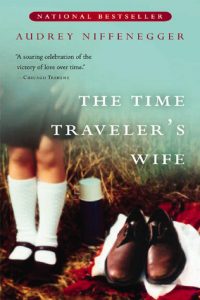
When Henry time travels, he always arrives naked and has to steal clothes and money or get someone to give them to him and to survive in the cold and escape being arrested for his nudity in public. Through reading that book I realized how much I like it when time travel presents real difficulties for the traveler and when it haunts the reader.
Sirius: In that movie I mentioned, “Guest from the Future” (and the series of kids’ books by Soviet writer Kir Bulychev), the main character is a girl from the future something like a hundred years ahead from the 1970s-1980s. She often gets to travel to the past for whatever various reasons (in time travel machine). In the movie though before Alisa ends up in “our time” the boy from “our time” ends up in the future. Why you say? His mom sends him on an errand. On the way he runs in the school mate who is observing a strange woman always disappearing into the old building. Of course the twelve-year-old boys have to investigate the mystery and it turns out that the woman is a time traveler who avoids them just in time to go back to her future. Our hero though sees a machine which could not / would not / didn’t have to be properly secured and goes to check it out because of course he would! And then all the mayhem and adventures both in past and present to follow.

Layla: I don’t care if the time travel makes sense, and I prefer it when the time travel happens accidentally. What I enjoy most is the fish out of water element like I said earlier–I like when a modern heroine has to navigate in a space that is unfamiliar. I think there is lots of room for humour and comedy and also that there is a fantastical element–dressing in beautiful clothes, being an aristocrat, and most of all, meeting or falling in love with a handsome chivalrous guy. There is an element of chivalry and romance and also courtship that can unfold in a historical setting that isn’t present in the same way in a contemporary context.
Consequences Jayne: There was one book, A Stitch in Time by Amanda James, where the travel was deliberate and meant to change things – but change them back to the things that needed to have happened but which had somehow got messed up. But beyond a neat premise, everything about it was wobbly including all the rules the author invented. It’s been years since I read it but I still remember this annoyed me.
Janine: In one of the most excellent books I’ve read in recent years, a science fiction thriller called The Gone World by Tom Sweterlitsch, the heroine has to travel to the future to find out more about an event that will annihilate all human life, her own included. She can only go to possible futures, not to the actual future, because by visiting them and bringing back information to the present, she causes the future to alter. She has to be on guard from other people in the future because if they figure out that she is a time traveler they may capture her to keep their timeline intact. All that was innovative and really well-executed.

Janine: I have mixed feelings about the trope about changing the past to change the future. It can be really engaging if but it’s also an eye roller. Your parents might not meet if you change things, and then you wouldn’t exist. Is the main character really that selfless? It takes some suspension of disbelief, so I need a strong motive.
One of the things I loved about The Time Traveler’s Wife is how it deals with the paradoxes of time travel. Henry can encounter himself and he uses that in useful ways, for example, his adult self trains his child self in pickpocketing so that he’ll be able to survive as a kid. He remembers the incident from both perspectives. It happens in Chicago’s Natural History Museum, which the child Henry loved, and at first it was really magical for him. When he realized what he was actually there to happen and that there was no solution to his involuntary time travel, little Henry was disillusioned. Adult Henry remembers this experience well even as he is disillusioning Henry the boy by teaching him these skills.
Time in the book functions like a mobius strip. Henry can buy a winning lottery ticket or Microsoft stock because his future self tipped him and told him that his profiting from these things will happen, but he can’t prevent anything if it is already a fact in any portion of the timeline, even if it lies ahead. The rules are entirely consistent.

See above, I don’t want for time traveler to influence anybody if they travel to the past. We’d love to hear from you on these topics. Do you like to read about time travel and what makes it successful for you? What is your favorite means of time travel in books? How important to you is it that the rules be consistent and the consequences make sense?
Share this:
Sirius started reading books when she was four and reading and discussing books is still her favorite hobby. One of her very favorite gay romances is Tamara Allen’s Whistling in the Dark. In fact, she loves every book written by Tamara Allen. Amongst her other favorite romance writers are Ginn Hale, Nicole Kimberling, Josephine Myles, Taylor V. Donovan and many others. Sirius’ other favorite genres are scifi, mystery and Russian classics. Sirius also loves travelling, watching movies and long slow walks.
As a kid and young adult I read tons of time-travel books. But then I disliked Outlander and stopped, until years later I picked up and was entranced as I read The Time Traveler’s Wife. I hated its ending so much that I haven’t read another time travel novel since.
And oh, do I remember Scholastic Books! Among the best memories of my childhood.
@ LML : I did not grew up with Scholastic Books. Harry Potter was my first introduction to them :). I was not a fun of The time Traveler’s Wife ending myself .
@ LML : @ Sirius : I’ve heard enough people say negative things about TTTW that I’ve never been interested in reading it.
I’ve never been much of a fan of time-travel (whether romance or straight-up SF). Oddly enough, about the only time-travel romance that ever worked for me (and, coincidentally, about the only one of her books that ever worked for me) was a very early Lisa Kleypas book, GIVE ME TONIGHT. It’s set in Depression-era Texas where the heroine lives with her older aunt, who often talks about a big family tragedy that happened about 50 years before. Somehow, the heroine is transported back to a big ranch in 1880s Texas, where she inhabits the body of her great-aunt. She is there to help avert the tragedy, and she falls in love with the ranch foreman in the process. I liked everything about the book, but I’m not sure Kleypas even acknowledges it anymore. It’s certainly never been available as an ebook.
Time travel is not one of my favorite tropes. In other words, I don’t seek out time travel books for the trope, but will pick them up for other reasons or if I’ve gotten a lot of good feedback from trusted sources. And, yes, I want the consequences and internal logic to make sense or at least be executed in a way that I can suspend belief.
I do remember those Scholastic book catalogues and looked forward to ordering from them when I was a youngster. One of my favorite children’s classics with time travel is Tom’s Midnight Garden by Philippa Pearce. It’s a great book for all ages!
@ DiscoDollyDeb : After you mentioned the Kleypas book before, I went to Amazon and saw they only had paperback copies for more than I wanted to pay.
@ Jayne : I tried reading it and couldn’t stand Henry so I never joined the fan club !!
I do love time travel and in a total aside, because of this post and discussion I started watching the outlander series and omg it’s so good!!!! The costumes and the castles!
Also— I enjoy the shock when time travelers encounter others who are but who are integrated or hiding it. I remember the shock of that revelation in Outlander. Usually, in romance at least, the heroine goes back alone and it’s a very singular and mysterious process. I enjoy that too of course
I was a big fan of books featuring time travel and similar tropes and read many of them when I was younger. I still read them from …pun intended… time to time. Most recently I’ve read The Gone World (mentioned above) and Yesterday Is History by Kosoko Jackson.
I don’t have a favorite means of time travel. I enjoyed Jack Finney’s Time and Again where the characters dress in clothes of the day and surround themselves with things of that time and basically think themselves back in time. I’ve also enjoyed books where the characters use equipment to travel in time such as (inadvertently in) Shay Savage’s Transcendence or (deliberately in) the Out of Time series by C.B. Lewis. I’ve also enjoyed books that use magic as a means of time travel such as the Lost in Time series by A.L. Lester. If the author writes a good book, I’m happy to read it!
I look forward to the next post!
@ Kareni : Thanks for reminding me about Out of time series. Must go check what I liked and what not, because I remember mostly nothing right now :)
@ Jayne : To be sure I mostly disliked the ending. Thought the book okay otherwise.
I wish that I still liked time travel stories, but I’ve learned through painful experience that they are usually dark/poignant/bittersweet/dystopian/horror or illogical, so that I cannot enjoy them.
That said, I’m enough of a sff aficionado to be able to know that Outlander began as a Doctor Who fan-fic (on the 2nd Doctor’s “Companion”, Jamie), and that the storyline of River Song in Doctor Who was blatantly based on tTTWife.
Will I pick up a time travel book again? It would need to be extraordinary.
Thanks for the conversation!
P.S. – IIRC, Jude Deveraux wrote a time travel romance. Did anyone else read it?
I’m fine with time travel and don’t think too hard about whether it makes sense or not, but I really haven’t read that many and it’s not something I seek out. A few I have liked are: Linda Howard’s Son of the Morning (have not read in a really long time), Susannah Kearsley’s The Rose Garden, and Kelley Armstrong has recently written A Stitch in Time and A Twist of Fate that I thought were fine, but I like some of her other writing a lot better.
I love time travel books – I like the what if? theme. What would it really be like to go back in time? I loved Son of the Morning and The Rose Garden. TT Wife not so much – I really disliked the ending.
One thing I’m not fond of is having lots of connected people going backwards and forwards to the same place, so that the past becomes almost a cosy commonplace destination. I think it was Lynn Kurland who had several like that.
I very much liked Nicola Cornick’s The Phantom Tree, which is unusual in having a heroine who’s come forward in time (Tudor times to contemporary). I’d love recommendations for any others like that.
I don’t seek time-travelling stories out, but I will read them if the plot interests me. I’m not interested in how the time travel happens (that I feel is a mere McGuffin to get the plot rolling) – but I do want fairly consistent rules about what can or can’t happen while the protagonist(s) are travelling. Thinking about it, I realize that overall I’ve read and enjoyed more science-fiction based TT stories than romance ones. I’m not sure why I prefer science fiction over romance when it comes to TT – maybe because if I am consciously choosing a TT story, I’m going to want the TT aspect and its possible paradoxical consequences to be central to the plot. In a lot of the romance TT stories that I’ve read, the TT aspect seems to serve more as a way for the MCs to meet cute.
Back in 90s when time travelling was a big romance trope I read a fair number (e.g., Devereaux’s A Knight in Shining Armor, Linda Howard’s Son of the Morning, some category ones by Nora Roberts). I’m not sure how well most of thoseTT romances would hold up – certainly I don’t remember a lot of details about them and am not interested in tracking any down. (The one thing I do remember is that I was fine with the ending of AKISA, but I know lots of people hated it.) Outlander never worked for me, I DNF it several times, before I finally gave up on it.
Unlike Outlander I did finish TTTW. I wanted to like it (part of it was set near where I grew up), but I found it too melodramatic and problematical. Also at one point in the book Henry runs along the shore of Lake Michigan at low tide – but Lake Michigan (like all of the Great Lakes) does not have tides. (Emily Henry I believe makes the same mistake in Beach Read – why do authors, who have actually lived near Lake Michigan, make this mistake? Do they not ever go down to the beach and watch the lake? This is one of those errors that always, always knocks me out of a story.)
One TT book I think that straddles the romance/science fiction divide is The Jane Austen Project by Kathleen Flynn – the time travellers, a medical doctor and a literary scholar, go back to the year 1815 (they are from the distant future era and possibly also from an alternative timeline to ours). Their mission is to befriend Austen so that they can find and save a rumoured unpublished manuscript of hers and if they can, they are suppose to diagnose the illness that will lead to Austen’s death in 1817. Of course befriending Austen makes it harder and harder for the doctor to ignore the fact that she might be able to save Austen from a premature death, but at the cost of altering her own chance to return to her own time. Both the romance and time travel plot lines are equally important to the story.
On the clear science fiction side – Connie Willis has done a loosely connected series of time-travelling books and short stories around a group of Oxford historians at an underfunded university time-travelling institute. The stories range from fairly serious (Doomsday Book, All Clear, Blackout) to fairly light-hearted (To Say Nothing of the Dog). There is usually a light thread of romance, but not always a happy ending.
Some of my favourite science-fiction TT stories from my tween and teen years are A Wrinkle in Time, which isn’t about time travel in the way that most people think of it – but instead uses “folds” in the time/space continuiuum as a way to travel great distances through the universe extremely quickly; Kindred by Octavia Butler, about a 26 year-old African American woman, who inexplicably travels from 1970s America to the antebellum south; and Ray Bradbury’s short story, “A Sound of Thunder,” which is literally about the butterfly effect.
And I loved Scholastic Books Service – my battered childhood edition of Wrinkle in Time was just one of the many books I purchased from them.
@ Jayne : I hated the movie. Hated.
@ Misti : Kearsley’s are my favourite time travel books. The Rose Garden and Mariana are fantastic. The Winter Sea is time-travel adjacent I think but my favourite of her books.
I loved your discussion, as Time Travel has always fascinated me, but I was often disappointed by the execution. Not in the science of it, as I don‘t need it to be very accurate, but I want to be able to believe it, for it to make sense to me. Also I am very much a happily ever after reader, so some Time Travel stories are just too sad for me. I did an episode on my own podcast on the subject – here is the link to my page with the books and movies I mention in it. https://notjustcheeseandchocolate.wordpress.com/2021/11/21/episode-09-on-time-travel/
@ Suzanna : Have you tried Cornick’s “House of Shadows”? Kaetrin reviewed that one.
https://dearauthor.com/book-reviews/overall-b-reviews/b-minus-reviews/review-house-of-shadows-by-nicola-cornick/
@Hilly: I believe the Jude Devereux book is A KNIGHT IN SHINING ARMOR. I’d totally forgotten that one! Back in the day, I read a ton of her books, including that one. The heroine gets transported back in time (Elizabethan England?) and falls for the lord of the manor. Then he comes to the present with the heroine (where he’s fascinated by pencil sharpeners and Playboy magazine). This one has a very bittersweet ending: the heroine and hero do not stay together and there is no HFN/HEA, but the heroine does manage to alter events and salvage the hero’s historical reputation.
I love Groundhog Day style time travel romances where the character gets the chance to repeat a certain day or time period and influence the outcomes (or just to figure out how to stop the loop and escape!). Eventually I even wrote my own and had so much fun working out all the twists. I’ve loved the concept of time travel since I saw the old “Connecticut Yankee in King Arthur’s Court” movie with Bing Crosby on late night TV as a kid. I thought IN A HOLIDAZE by Christina Lauren was quite fun and a wonderful example of this romance trope within the time travel genre. It’s one of my favorites!
@ DiscoDollyDeb : We’re going to talk a bit about AKISA on Monday’s part II post. ☺
@ DiscoDollyDeb and @Jayne: I’m swamped this week and can’t comment much but yes, we discuss many of the books that have been brought up here, and some others tomorrow in Monday’s post. Since we don’t go into the ending of the book in detail, though, I just want to amend what DDD said briefly. Whether or not the hero and heorine end up together in A Knight in Shining Armor is debatable since
SPOILER . . . . . . . . . . .
The hero is reincarnated and the heroine meets him in the last scene.
. . . . . . . . . . . END OF SPOILERS
Since I believe that in RL most scientists say time travel, other than the standard forward movement we all experience, is impossible, I’m willing to suspend disbelief and usually don’t care too much about the method an author chooses to move her characters backward and/or forward in Time. I did find the Jack Finney method, however, just a little too far-fetched, as it left unexplained why re-enactors don’t move backward in time. Linda Howard was a hugely popular author when I began to read Romance, but the first book of hers I read was “An Independent Wife” (not a TT, about a woman who was more doormat than independent), and I despised it. But I then read and loved “Son of the Morning”. Didn’t have a problem with the way Devereaux brought her couple together in AKISA since it seemed that if I could accept TT I could accept reincarnation (or the possibility that the hero was a many-generations descendent of the original hero). IIRC, “The Changling Bride” by Lisa Cach has the heroine travel back to Georgian England when the fairies repay a debt owed to one of her female ancestors — so not only do you need to believe in TT, you need to believe in fairies. I’ve not read it in years but I remember I liked it at the time.
A recent TT book that is “Before the Coffee Gets Cold”, by Toshikazu Kawaguchi. It is romantic, poignant, bittersweet as it relates the stories of 4 people who get the opportunity to TT by sitting in a special chair in a Tokyo cafe. There are rules to be followed, the present isn’t changed, and the visit lasts only until the coffee gets cold. It’s different and an interesting take on what TT can, and can’t, achieve.
@ Susan/DC : “before the coffee gets cold “ sounds interesting will check it out thank you .
For a recent twist on this, try Totally Rad Wormhole by Douglas J. Eboch. Two nerds from the ’80s accidentally open a wormhole to today and meet their adult selves at their 30th high school reunion. They don’t like the future they see, so they go back and try to change the future from their end.
The most “believable” and best time travel books I have read are Connie Willis’ To Say Nothing of the Dog and Doomsday Book. In that world, time travel is a discipline and there are rules to how to behave when people go back in time (rather like on a field trip), and a time travel machine. I suppose another aspect of time travel in science fiction is when characters are frozen, and then reanimated many years later in the future – such as in Ann Leckie’s Ancillary Justice. I had forgotten about Linda Howard’s Son of the Morning, which I enjoyed back in the day.
@ msaggie : Interesting that time travel machines make it more believable for you and for Sirius. They actually make it less believable for me. My dad is a physicist so I know a little about this and I don’t see how one could ever be made. So a machine just makes me more aware that the author is making this up.
@Jayne – I’ve read most of Cornick’s books and enjoyed them. I like dual time lines, too, and she does those well. But The Phantom Tree is distinctive in having the heroine come forwards in time. Seems like a theme which could be used much more.
@ msaggie : To Say Nothing of the Dog was great. Funny and even has a romance thread with a HEA! :)
@ Janine : In Jodi Taylor’s Chronicles of St. Mary’s series, there’s a time travel machine but the technology is totally handwaved. There’s a brief bit in the first book where Max gets an explanation of the tech but she doesn’t relate it to the reader. I find less information is better for me in these circumstances so I thought it was a clever choice by the author.
@ Kaetrin : In almost all of the books I’ve read with time machines the technology is handwaved. It has to be handwaved anyhow because it’s such an implausible technology. Time machines don’t ruin the books for me or anything, they’re only a bit jarring. I mostly brought it up because Sirius and Msaggie’s take on them was very different than mine.
FTC Disclaimer
We do not purchase all the books we review here. Some we receive from the authors, some we receive from the publisher, and some we receive through a third party service like Net Galley . Some books we purchase ourselves. Login
Discover more from Dear Author
Subscribe now to keep reading and get access to the full archive.
Type your email…
Continue reading
April 26, 2023
Is Time Travel Possible?
The laws of physics allow time travel. So why haven’t people become chronological hoppers?
By Sarah Scoles

yuanyuan yan/Getty Images
In the movies, time travelers typically step inside a machine and—poof—disappear. They then reappear instantaneously among cowboys, knights or dinosaurs. What these films show is basically time teleportation .
Scientists don’t think this conception is likely in the real world, but they also don’t relegate time travel to the crackpot realm. In fact, the laws of physics might allow chronological hopping, but the devil is in the details.
Time traveling to the near future is easy: you’re doing it right now at a rate of one second per second, and physicists say that rate can change. According to Einstein’s special theory of relativity, time’s flow depends on how fast you’re moving. The quicker you travel, the slower seconds pass. And according to Einstein’s general theory of relativity , gravity also affects clocks: the more forceful the gravity nearby, the slower time goes.
On supporting science journalism
If you're enjoying this article, consider supporting our award-winning journalism by subscribing . By purchasing a subscription you are helping to ensure the future of impactful stories about the discoveries and ideas shaping our world today.
“Near massive bodies—near the surface of neutron stars or even at the surface of the Earth, although it’s a tiny effect—time runs slower than it does far away,” says Dave Goldberg, a cosmologist at Drexel University.
If a person were to hang out near the edge of a black hole , where gravity is prodigious, Goldberg says, only a few hours might pass for them while 1,000 years went by for someone on Earth. If the person who was near the black hole returned to this planet, they would have effectively traveled to the future. “That is a real effect,” he says. “That is completely uncontroversial.”
Going backward in time gets thorny, though (thornier than getting ripped to shreds inside a black hole). Scientists have come up with a few ways it might be possible, and they have been aware of time travel paradoxes in general relativity for decades. Fabio Costa, a physicist at the Nordic Institute for Theoretical Physics, notes that an early solution with time travel began with a scenario written in the 1920s. That idea involved massive long cylinder that spun fast in the manner of straw rolled between your palms and that twisted spacetime along with it. The understanding that this object could act as a time machine allowing one to travel to the past only happened in the 1970s, a few decades after scientists had discovered a phenomenon called “closed timelike curves.”
“A closed timelike curve describes the trajectory of a hypothetical observer that, while always traveling forward in time from their own perspective, at some point finds themselves at the same place and time where they started, creating a loop,” Costa says. “This is possible in a region of spacetime that, warped by gravity, loops into itself.”
“Einstein read [about closed timelike curves] and was very disturbed by this idea,” he adds. The phenomenon nevertheless spurred later research.
Science began to take time travel seriously in the 1980s. In 1990, for instance, Russian physicist Igor Novikov and American physicist Kip Thorne collaborated on a research paper about closed time-like curves. “They started to study not only how one could try to build a time machine but also how it would work,” Costa says.
Just as importantly, though, they investigated the problems with time travel. What if, for instance, you tossed a billiard ball into a time machine, and it traveled to the past and then collided with its past self in a way that meant its present self could never enter the time machine? “That looks like a paradox,” Costa says.
Since the 1990s, he says, there’s been on-and-off interest in the topic yet no big breakthrough. The field isn’t very active today, in part because every proposed model of a time machine has problems. “It has some attractive features, possibly some potential, but then when one starts to sort of unravel the details, there ends up being some kind of a roadblock,” says Gaurav Khanna of the University of Rhode Island.
For instance, most time travel models require negative mass —and hence negative energy because, as Albert Einstein revealed when he discovered E = mc 2 , mass and energy are one and the same. In theory, at least, just as an electric charge can be positive or negative, so can mass—though no one’s ever found an example of negative mass. Why does time travel depend on such exotic matter? In many cases, it is needed to hold open a wormhole—a tunnel in spacetime predicted by general relativity that connects one point in the cosmos to another.
Without negative mass, gravity would cause this tunnel to collapse. “You can think of it as counteracting the positive mass or energy that wants to traverse the wormhole,” Goldberg says.
Khanna and Goldberg concur that it’s unlikely matter with negative mass even exists, although Khanna notes that some quantum phenomena show promise, for instance, for negative energy on very small scales. But that would be “nowhere close to the scale that would be needed” for a realistic time machine, he says.
These challenges explain why Khanna initially discouraged Caroline Mallary, then his graduate student at the University of Massachusetts Dartmouth, from doing a time travel project. Mallary and Khanna went forward anyway and came up with a theoretical time machine that didn’t require negative mass. In its simplistic form, Mallary’s idea involves two parallel cars, each made of regular matter. If you leave one parked and zoom the other with extreme acceleration, a closed timelike curve will form between them.
Easy, right? But while Mallary’s model gets rid of the need for negative matter, it adds another hurdle: it requires infinite density inside the cars for them to affect spacetime in a way that would be useful for time travel. Infinite density can be found inside a black hole, where gravity is so intense that it squishes matter into a mind-bogglingly small space called a singularity. In the model, each of the cars needs to contain such a singularity. “One of the reasons that there's not a lot of active research on this sort of thing is because of these constraints,” Mallary says.
Other researchers have created models of time travel that involve a wormhole, or a tunnel in spacetime from one point in the cosmos to another. “It's sort of a shortcut through the universe,” Goldberg says. Imagine accelerating one end of the wormhole to near the speed of light and then sending it back to where it came from. “Those two sides are no longer synced,” he says. “One is in the past; one is in the future.” Walk between them, and you’re time traveling.
You could accomplish something similar by moving one end of the wormhole near a big gravitational field—such as a black hole—while keeping the other end near a smaller gravitational force. In that way, time would slow down on the big gravity side, essentially allowing a particle or some other chunk of mass to reside in the past relative to the other side of the wormhole.
Making a wormhole requires pesky negative mass and energy, however. A wormhole created from normal mass would collapse because of gravity. “Most designs tend to have some similar sorts of issues,” Goldberg says. They’re theoretically possible, but there’s currently no feasible way to make them, kind of like a good-tasting pizza with no calories.
And maybe the problem is not just that we don’t know how to make time travel machines but also that it’s not possible to do so except on microscopic scales—a belief held by the late physicist Stephen Hawking. He proposed the chronology protection conjecture: The universe doesn’t allow time travel because it doesn’t allow alterations to the past. “It seems there is a chronology protection agency, which prevents the appearance of closed timelike curves and so makes the universe safe for historians,” Hawking wrote in a 1992 paper in Physical Review D .
Part of his reasoning involved the paradoxes time travel would create such as the aforementioned situation with a billiard ball and its more famous counterpart, the grandfather paradox : If you go back in time and kill your grandfather before he has children, you can’t be born, and therefore you can’t time travel, and therefore you couldn’t have killed your grandfather. And yet there you are.
Those complications are what interests Massachusetts Institute of Technology philosopher Agustin Rayo, however, because the paradoxes don’t just call causality and chronology into question. They also make free will seem suspect. If physics says you can go back in time, then why can’t you kill your grandfather? “What stops you?” he says. Are you not free?
Rayo suspects that time travel is consistent with free will, though. “What’s past is past,” he says. “So if, in fact, my grandfather survived long enough to have children, traveling back in time isn’t going to change that. Why will I fail if I try? I don’t know because I don’t have enough information about the past. What I do know is that I’ll fail somehow.”
If you went to kill your grandfather, in other words, you’d perhaps slip on a banana en route or miss the bus. “It's not like you would find some special force compelling you not to do it,” Costa says. “You would fail to do it for perfectly mundane reasons.”
In 2020 Costa worked with Germain Tobar, then his undergraduate student at the University of Queensland in Australia, on the math that would underlie a similar idea: that time travel is possible without paradoxes and with freedom of choice.
Goldberg agrees with them in a way. “I definitely fall into the category of [thinking that] if there is time travel, it will be constructed in such a way that it produces one self-consistent view of history,” he says. “Because that seems to be the way that all the rest of our physical laws are constructed.”
No one knows what the future of time travel to the past will hold. And so far, no time travelers have come to tell us about it.
Time travel – 6 ESL English Discussion Questions

Here are 6 Conversation Questions about the topic of “ Time travel ”:
1- Have you ever seen any time traveling movies ? Was the concept structured logically?
2- Do you think that one day people will be able to travel in time? Why? / Why not?
3- If you could travel in time, would you go to the past or the future ? Which year/era and why?
4- If time travel were possible, what one event would you like to go back and change or witness?
5- If you could travel into the future , but never return , would you do it? Why? / Why not?
6- According to Albert Einstein’s famous equation, E = mc² , time travel is possible, at least in one direction. Do you think it’s possible or that the “ Grandfather Paradox ” makes it impossible?
Leave a Comment Cancel Reply
Your email address will not be published. Required fields are marked *
Save my name, email, and website in this browser for the next time I comment.
EnglishPost.org
60 Travel Conversation Questions
One of the dreams that people have is to travel around the world and know more places, meet new people and enjoy some adventures.
People love traveling and there are many reasons for doing so, such as:
How about you? What are your reasons for traveling?
Talk about it with this list of travel conversation questions
Table of Contents
Travel Conversation Questions: Places
Travel conversation questions: people, travel conversation questions: your next vacations, travel conversation questions: your last vacation, travel conversation questions: your luggage, travel conversation questions: preferences, travel conversation questions: general questions, travel questions: channels, travel questions: safe places, more esl conversation questions.
Instead of having a long list of travel conversation questions, it is better to have them categorized to make everything easier.
These are 60 travel conversation questions that have been divided into different categories such as:
Let’s explore each one of these different categories
When we search on the internet, we can find a list of recommendations about places to visit.
These are conversation questions to discuss the best and worst places to visit:
- Have you ever been abroad?
- How many countries have you visited?
- Have you visited many touristic places in your country?
- What tourist places do you like to visit?
- Do you prefer visiting beaches or mountains?
- Have you ever visited a European country?
- Have you ever visited an African country?
- What’s your best vacation memory?
- What’s your worst vacation memory?
- What countries would you like to visit?
- What countries would you not like to visit?
- What’s the best place for a vacation in your country
I understand that some people like traveling alone but others prefer some company and have better memories.
These questions have to do with your favorite people to go on vacation:
- Who do you travel with?
- Have you made friends while you are on vacation?
- Do you like to travel with children?
- Do you like to travel with your parents?
- Do you like traveling alone or in a group?
- What are some of the benefits of traveling alone?
Some people plan their vacation since they have to ask for permission, save money and choose the best time of the year to do it.
These questions will help you talk about plans that you have for your next vacation:
- What places are you planning to visit?
- Who are you planning to go with?
- When are you planning to go?
- Where are you planning to stay?
- What sights are you planning to see?
- When will you next go to the beach? Which beach is your favorite?
Some people love sharing information about their last vacation and some people don’t.
These are some questions to discuss your last vacation
- Where did you go on your last vacation?
- Who did you go with?
- Where did you stay?
- What did you do there?
- What did you see there?
- How much money did you spend there?
- Who was the most interesting person you met?
- How long did you stay there? Did you want to stay longer?
Most people don’t have a problem with their luggage when they travel, while others find issues such as:
These are some conversation questions that have to do with preparing stuff to travel:
- How much luggage do you usually carry?
- Do you bring electronic devices when you travel?
- What are some things you always take with you on a trip?
- Do you like to pack light when you travel?
- Do you think that everyone overpacks?
- How many of the things do you pack do you actually use or need?
- Have you ever lost your luggage?
- Do you worry about your luggage when you travel?
These are some questions about what you prefer to do when you are on vacation:
- Do you prefer to travel by car or plane?
- Have you ever bought a package tour?
- Where do you prefer to stay when you go on a vacation?
- How often do you travel?
- How often do you go camping?
- How long do you like vacations to be?
- What means of transport do you like to use when you are on vacation?
- Do you like to try local food when you travel?
- What is the best age to travel?
- Where do you like to stay when you go on vacation?
These are some general questions about traveling:
- Are you a traveler?
- What do you miss the most when you are traveling?
- Have you ever had an accident while traveling?
- Have you ever been on a cruise?
- What do you think about hitchhiking?
- If money was not an issue, what type of holiday would you take?
- Have you ever missed a flight? What happened?
Travel blogs and YouTube channels have become very popular.
Channels tend to have an edge over travel blogs since you get a better idea of the country you are planning to visit
- Do you follow travel blogs?
- Do you follow Travel Youtube channels?
- Do you usually search for videos or posts about the countries or places you are trying to visit?
- Have Travel blogs or channels make you want to travel more
If you are a traveler, you don’t want anything to happen to you, your friends, and your family.
These are some questions about safe countries and places to travel to:
- What are some of the safest places to travel to?
- Have you ever been robbed when traveling?
- Do you only travel to the safest countries?
- Do you share your travel information with someone you trust?
- Do you worry about how much you drink when traveling?
- Do you try not to draw attention when traveling?
- Do you wear jewelry when you travel?
- Are you aware of scams when you travel?
- Do you Keep digital copies of important documents?
Did you find these travel conversation questions useful?
This is one of our newest sections. Use these questions to promote speaking in the classroom.
- 50 Conversation Questions about Entertainment
- Conversation Questions about Careers and Jobs
- Social Networks Conversation Questions
- 50 Conversation Questions about Computers
- 70 Music Conversation Questions
- 30 Brilliant Conversation Starters for the ESL Classroom
- 70 School Conversation Questions
- 100 Great Health Conversation Questions
- 32 Immigration Discussion Questions
- Friends Conversation Questions
- ESL Conversations: 50 Conditional Questions
If there are travel conversation questions that you would like me to add, send them via Facebook messenger
I am Jose Manuel, English professor and creator of EnglishPost.org, a blog whose mission is to share lessons for those who want to learn and improve their English
Related Posts

TikTok Conversation Questions for Classroom Use

30 Technology Discussion Questions

Discussion Questions about Artificial Intelligence (AI)
- Cast & crew
- User reviews
Frequently Asked Questions About Time Travel

While drinking at their local pub, three social outcasts attempt to navigate a time-travel conundrum. While drinking at their local pub, three social outcasts attempt to navigate a time-travel conundrum. While drinking at their local pub, three social outcasts attempt to navigate a time-travel conundrum.
- Gareth Carrivick
- Jamie Mathieson
- Chris O'Dowd
- Marc Wootton
- Dean Lennox Kelly
- 85 User reviews
- 42 Critic reviews

- (uncredited)
- Monkey Mayhem Promoter
- Dart Player
- All cast & crew
- Production, box office & more at IMDbPro
More like this

Did you know
- Trivia This was Director Gareth Carrivick 's final production. He died of leukemia the 16th of March 2010, less than a year after the movie was released in the UK.
- Goofs After Pete calls Ray and Toby in to the beer garden to look at the painting, a crew member can be seen as Toby is emerging from the pub.
Ray : Little bit weird, but ummm... turns out everybody in the future, American.
- Crazy credits SPOILER: After the end credits have finished, a 20 second scene features Toby (Dean Wootton) being chased by an animalistic double. As Ray (Chris O'Dowd) and Pete (Dean Lennox Kelly) look on, a double of Pete says "this is all getting a little bit too complicated."
- Connections Featured in WhatCulture Originals: 10 Great Sci-Fi Movies (Nobody Ever Talks About) (2020)
- Soundtracks Kayleigh Written by Fish (as Dick)/ Mark Kelly (as Kelly)/ Steve Rothery (as Rothery)/ Pete Trewavas (as Trewavas)/ Ian Mosley (as Mosley) Published by EMI Music Publishing Ltd. Performed by The Count Down Singers Licensed by kind permission of Count Down Media
User reviews 85
- A review by Jamie Robert Ward (http://www.invocus.net)
- Oct 21, 2009
- How long is Frequently Asked Questions About Time Travel? Powered by Alexa
- April 24, 2009 (United Kingdom)
- United Kingdom
- FAQ About Time Travel
- London, Greater London, England, UK (on location)
- Dog Lamp Films
- See more company credits at IMDbPro
Technical specs
- Runtime 1 hour 23 minutes
Related news
Contribute to this page.

- See more gaps
- Learn more about contributing
More to explore


Recently viewed
Breaking News English
Home | help this site, discussion questions - listening, listen to the 20 questions..
- Put the words below in the correct order to make the questions.
- Press the "refresh" button on your browser to play again.
- ...or look below to see the 20 Questions.
Back to the time travel lesson .

See a sample
- pre-reading and listening
- while-reading and listening
- post-reading and listening
- using headlines
- working with words
- moving from text to speech
- role plays,
- task-based activities
- discussions and debates
Time Travel - The 20 Questions
Student a's questions (do not show these to student b).
- What did you think when you read the headline?
- What images are in your mind when you hear the word 'time'?
- What do you know about Stephen Hawking?
- What should happen at the memorial service?
- Would you like to be a time traveler?
- If you went back in time, what historical event would you change?
- How would you explain the history of time?
- What would you ask a tourist from the future?
- What would time travelers from the past think of today's world?
- What do you think of the concept of time travel?
- E-mail this to a friend
STUDENT B's QUESTIONS (Do not show these to student A)
- Did you like reading this article? Why/not?
- What do you think of when you hear the word 'travel'?
- What do you think about what you read?
- What do you know about the cosmos?
- What period in time would you like to go back or forward to?
- Would you prefer to travel back or forward in time?
- How can we prove or disprove time travel?
- What would time travelers from the future think of today's world?
- Do you think time travel will be possible one day?
- What questions would you like to ask a time traveler?
Online Activities
- 27-page lesson (40 exercises)
- 2-page MINI lesson
- Speed Read (4 speeds)
- Text jumble
- Prepositions
- Missing letters
- Initials only
- Listen & spell
- Missing words

- Ask RAI / Inspiration / Solo Travel / Travel / Travel Trivia
Top Travel Questions | 200 Fun + Engaging Questions About Travelling To Ask
Published February 8, 2023 · Updated February 8, 2023

Travelling the world is a dream for many, myself included . I quit my job in 2012 to travel and have been living out of a suitcase ever since. A countless number of adventures and an immeasurable number of conversations later , I think back on all the questions I’ve been asked through it all by fellow travellers I have met along the way as well as friends back home. Find a collection of these travel questions in this post . Answer as many as of these questions about traveling as you can and use them as conversation starters the next time you find yourself on an adventure of your own.
If you’d like to know my personal answer to any of these questions, feel free to contact me or start a conversation of our own on insta . Enjoy!
Whether you find yourself waiting at the airport, on an overnight journey by bus or train, or simply hanging with new found friends while abroad, these questions make for some perfect conversation starters and are sure to get the good vibes flowing .
I’ve split this into sections to make it easier to read. You will find a list of fun travel questions , interesting and enticing questions about travelling as well as some random would you rather questions. Maybe you’re looking for some travel trivia or an engaging travel question for Instagram — find it all ⬇⬇
Be sure to save this post or bookmark it to easily find it during your next journey. Let’s get into it….
>> Read Next:
100 of the BEST Road Trip Questions for those long drives The Top 50 Travel Songs to add to your road trip playlist The best words for a travel lover from foreign languages Essential flying tips for the first time flyer Test your skills with this world geography quiz
✓ FUN TRAVEL QUESTIONS
What to ask people who travel? Find a list of fun questions about traveling that are bound to keep the conversation flowing from beginning to end!

- You win the lottery tomorrow. Where are you travelling to first?
- What is your favourite aspect about traveling?
- What is the weirdest food you’ve ever tried while traveling ?
- What are sure signs of being a travel addict?
- Are you a city traveller or nature explorer?
- Have you ever hitchhiked? If not, would you ever consider doing it?
- Are you a member of the mile high club?
- Have you ever been on a cruise?
- Choose one famous person or celebrity to travel with?
- Have you ever flown first class?
- How many countries have you been to ?
- What is your favourite city ?
- Where you would you rather be right this moment?
- Do you prefer a window seat or aisle seat on a plane?
- What is the most exotic food you’ve tasted?
- Where is the weirdest place you’ve slept during your travels?
- Would you rather go on a safari, have a city break, or visit a tropical island ?
- Have you ever been camping while abroad?
- What is your favorite travel song ?
- How many of the 7 wonders of the world have you seen?
- What is the best and worst thing about travelling to a new country?
- Beach or mountains ?
- What is your most valuable travel possession?
- Have you fallen in love while travelling?
- What is your favourite vacation song about summer and the beach ?
- What movie and/or has inspired a previous trip of yours?
- What’s a funny or strange travel story of yours?
- Have you ever been on a safari?
- What is your drink of choice on a plane?
- What is you go to remedy for jet-lag?
- What is the favorite stamp in your passport?
- Do you have any embarrassing travel stories?
- What is the most adventurous thing you’ve done during your travels?
- What characteristics make for a cool travel partner?
- Have you ever been snorkelling? If so, where?
- What is the best gift to give to a traveller?
- Describe a dream travel experience?
Check out this list of the: 10 best cheap tropical islands to visit around the world
✓ OPEN-ENDED TRAVEL QUESTIONS
I am a huge fan of not just fun travel questions to ask, but also deep and open ended questions that are often accompanied with some insightful responses and interesting debates. What are some questions about travel?

- How does travel and seeing the world inspire you?
- How many countries do you want to discover in your life?
- How often do you travel? How many days in a month/weeks in a year are you away from home?
- Where do you feel most at home?
- What has been your biggest adventure so far?
- Why do you travel?
- What is the most exotic destination you’ve been to?
- What are some of the lessons that travel has taught you?
- What has been your worst trip or worst travel experience?
- What can you not travel without?
- Where is the most beautiful place you’ve ever seen?
- Have you ever made any of these mistakes while flying ?
- How do you feel on your return home?
- What travel experiences are at the top of of your bucket list?
- When you’re not on the open road, what is the thing you miss most about travelling?
- Are there more advantages to travelling alone or with others?
- What is your best travel tip ?
- What has been your biggest travel mistake?
- What cities would you love to discover?
- What is the best airport for a long layover ?
- When you’re away, what do you miss most about home?
- Who do you usually travel with?
- What is the difference between a tourist and a traveller?
- Do you think its safe to travel during the covid-19 pandemic?
- Did you have any bad travel experiences?
- What has been the most stressful part about travel for you?
- If you could choose one place to live anywhere in the world, where would you most like to live?
- What is your main concern when travelling?
- Do you have a favourite airline?
- What is the scariest thing that has happened to you while traveling?
- When do you feel the most alive?
- Do you travel with a fixed plan or usually just wing it?
- What’s been the biggest struggle you’ve experienced about travel?
- What is your favorite childhood travel memory?
- How has corona covid-19 affected your traveling lifestyle?
- Do you think countries closing their borders was a good move?
- How do you feel about a travel pass?
The important of travel and exploring the world cannot be stressed enough. Here are the 10 key advantages of travelling
Keep reading for more ideas + fun traveling questions to ask …
✓ ENGAGING QUESTIONS ON TRAVEL
How do you talk about travelling? In developing a conversation, few things compare to getting into the head of the other person. Here are a number of thought-provoking questions on travel to get to know someone a little better.
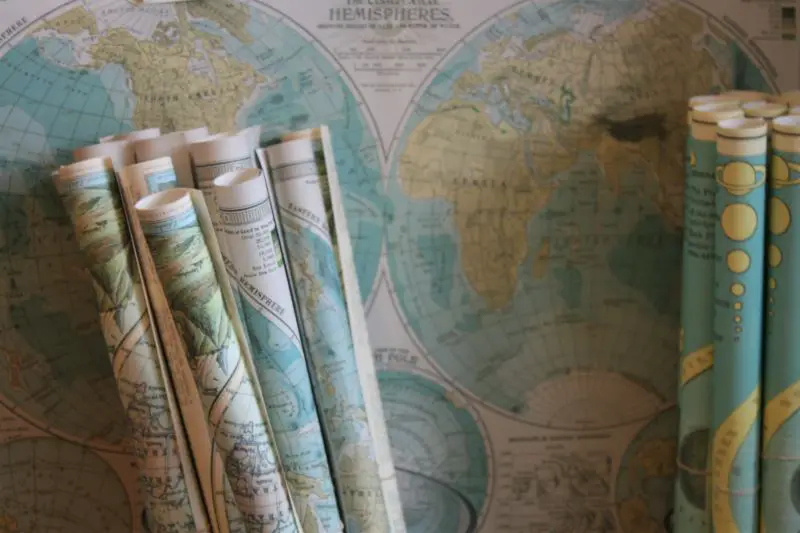
- What do you think is the main benefit of travel ?
- What does the concept of home mean to you ?
- Is it the journey or the destination that’s most important to you?
- What motivates you to travel?
- What is the biggest barrier to long term travel?
- What about traveling do you enjoy the least?
- What is the very first place you’ve visited?
- What has been your best trip?
- Have you ever gotten really lost while abroad?
- What are some things you always take with you on a trip?
- What characteristics and traits are essential for being a traveler?
- What is your preferred means of transport when traveling?
- Do you have any destinations that you would not like to visit?
- What is the most beautiful city you’ve visited ?
- Do you learn a few phrases of the local language before visiting a new country?
- Which country has the best food?
- What is your earliest travel memory of being on vacation?
- Do you make friends easily while on the road?
- What are some of the disadvantages of long term travel?
- Are you a fan of trying out local foods?
- How do you choose where to travel to?
- Which places hold a special place in your heart?
- What’s the best travel advice you’ve received?
- What is your travel style? Relaxing beach island vacation or city-to-city explorations?
- What are your thoughts on ecotourism and being a responsible tourist ?
- What is the worst injury you’ve gotten while traveling?
- Which island would you love to visit with your family ?
- What would surprise people the most about long term travel?
- Are you enticed by the life of a digital nomad ?
Care about how many countries you’ve been to? Here’s why you should stop counting
✓ INTERESTING TRAVEL QUESTIONS TO ASK
It’s bound to be an interesting and enlightening talk with these deep thinking questions for a travelling companion. How do you ask travel questions?

- How has travel changed you throughout the years?
- What is your favourite part about travel?
- Where did you travel to internationally for the first time?
- If you could travel to anytime in the past , where would you go?
- Where would you love to explore next?
- Where was the last place you’ve been to?
- What is the longest you’ve been away from home for?
- What is the longest flight you’ve taken?
- Do you plan and book your holidays yourself or do you get it done through a travel agency or third party agent?
- Have you ever lived in another country for an extended period of time? If so, where?
- What travel advice would you give to someone traveling internationally for the first time?
- What is the most trouble you’ve been in while traveling?
- Have you ever gotten scammed while in another country ?
- Do you prefer to travel solo or as part of a group?
- Where would you like to go on vacation to?
- Where is the best place you have hiked in?
- Where do you prefer to stay? Hotel/hostel/apartment/couchsurfing?
- Have you explored a lot of your home country ?
- What do you think is the biggest advantage of solo travel?
- Who is the most interesting person you’ve met during your travels?
- Have you ever missed a flight?
- Are you a member of any frequent flyer programs?
- Which place would you not visit again?
- If you speak more than one language, which language is the easiest and hardest to learn?
- What is your favorite museum?
- What is a typical meal like from your country ?
- What travel apps you you use most often?
- How many passports have you gone through?
- What home food do you miss most when travelling abroad?
- Are there any aspects of a foreign culture that you will never get use to?
Speaking of a foreign culture.. Here are: the most strange and exotic foods eaten across the world
✓ TRAVEL QUESTIONS FOR INSTAGRAM
Travel and exploring the world is my favorite past-time. But you already knew that, right? Here are travel questions to ask to get you talking about past vacations , favorite destinations, future travel aspirations, and bucket list places . What to caption a travel photo?

- Where is the most amazing place you’ve encountered during your travels?
- Do you prefer to travel to famous and popular destinations or off the beaten track spots?
- How many photos are saved on your hard-drive in total?
- What is your favourite foreign cuisine?
- What is your favorite word for travel ?
- What inspires you to travel?
- Do you usually bring back souvenirs for your trip?
- What travel quote do you live by?
- What country (or countries) would you like to visit the most?
- How many days until your next vacation?
- What place should everyone see at least once in their lifetime?
- Are there any popular places or destinations you’d like to avoid?
- What is the best place to visit in your own country?
- What are your favourite countries?
- Do you prefer novel stimulating experiences or a chilled out relaxed vacation?
- Do you keep a journal to document all your experiences exploring the world?
- What was the most recent road trip you took?
- What is your best-loved national park?
- What is your favourite tropical island ?
- What is your favourite city for a weekend break ?
- What is the most money you’ve spent on a plane ticket? Where’d you go?
- What is your favorite foreign dessert ?
- Where was your first vacation with your family ?
- What is your most prized travel possession?
- Which city has the best street food?
- What one place do you have to visit before you die?
- Are you planning on travelling again soon in a post pandemic world?
- Which country has the most beautiful flag ?
- How does travel bring meaning to your life ?
I’ve had a lot of misadventures and crazy travel experiences over the years. Here are a couple of my misadventures
✓ WOULD YOU RATHER QUESTIONS ABOUT TRAVELLING
A simple format of intriguing and fun questions for traveling. Present these to your fellow travelers with these odd, funny, and interesting scenarios to get into some great conversations.

- Would you rather lose all your travel photos or all of your money?
- Would you rather travel back in time and meet your ancestors or forward in time to meet your descendants?
- Would you rather travel the world by plane, train, or ship?
- Would you rather see a lot of countries for a little bit or get to know one in-depth?
- Would you rather explore the deepest part of the ocean or outer space?
- Would you rather upgrade your flight to first class or your hotel room to the penthouse suite ?
- Would you rather go hiking, visit museums, or to the beach ?
- Would you rather be the last person left on earth, or be one of the first people on Mars but you’ll never come back home?
- Would you rather swim with dolphins or go shark cage diving?
- Would you rather be able to pause, rewind, or fast forward time?
- Would you rather only speak English or speak every language in the world except for English ?
- Would you rather travel the whole world but never finding love or finding your soulmate but never being able to travel?
- Would you rather be able to speak all languages or be able to talk to animals?
- Would you rather explore the dessert heat of the Sahara or the icy landscape of Antarctica?
- Would you rather have the super power of teleportation or flying?
- Would you rather have a summer beach vacation or a winter mountain trip?
- Would you rather discover the jungle on an African safari or the sea on a cruise?
- Would you rather sleep in a room in a haunted hotel or filled with snakes?
- Would you rather walk the entire Great Wall of China or climb Mount Kilimanjaro ?
- Would you rather live the life of a king alone or live like a nomad with your friends and family ?
- Would you rather watch the rising sun or the setting sun ?
- Would you rather go on lots of small trips or one long trip?
- Would you rather be able to tell your past self one thing or be able to ask your future self one question?
I hope you’ve appreciated this complete set of travel questions. I’ve included more than enough vacation questions to fuel those conversations with a traveler or while discovering the world. What are some of your favorites? And did any of these reveal some insights or breakthroughs?
>> Read next:
Keep the conversation going with these 100+ epic questions for road trips The ultimate list of quotes about travelling and smiling to keep the positive vibes flowin’ The top 10 advantages of travelling the world The best vacation songs to include on your summer playlist Should you talk to strangers ?
Happy travelling! Rai
You may also like...

Here’s What Dubai Looks Like From the Sky in a Seaplane (With Seawings Dubai)
February 9, 2023
by Raihaan · Published February 9, 2023 · Last modified February 19, 2023

200+ Best Beach Captions for Instagram
March 22, 2023
by Raihaan · Published March 22, 2023

200+ Ways To Say I LOVE YOU in Different Languages ❤️ (w/ Pronunciation!)
February 12, 2023
by Raihaan · Published February 12, 2023 · Last modified February 13, 2023
4 Responses
- Pingbacks 0
I love this site. Continue the good work!
Thanks a lot.
This list is amazing! 💯
Glad you like 🙏
Leave a Reply Cancel reply
Your email address will not be published. Required fields are marked *
- Next story Here’s What Dubai Looks Like From the Sky in a Seaplane (With Seawings Dubai)
- Previous story 100+ Perfect Short Smile Quotes in 2024
WHO IS ARAIOFLIGHT ✈

Welcome to A Rai of Light!
A home for extraordinary people around the world. If you've ever felt like there must be more to life, this site is for you.
Out of a love for travel, writing, photography, sharing stories and a desire to inspire others , I created this space to connect with other like-minded individuals.
Along the way, I share my journey and strategies on Travel , Art and Life . Enjoy!
DISCOVER MORE: POPULAR ✈
- Recent Posts
- Popular Posts

How Many Countries Have You Been to? Here’s Why You Should NOT Keep Count.

150+ Ways To Say GOOD MORNING in Different Languages Around the World

10 Cheapest Islands in Greece in 2024 for an Affordable Greek Holiday

The Most Beautiful Landmarks in Africa You MUST SEE in Your Lifetime

The BEST Kebab in Istanbul: 15 Restaurants to Find the Best One!

6 Cool + Fun Places To Go in California With Friends

21 Cheapest Countries in Europe To Visit in 2024

List: Which Countries Can You Visit on a Schengen Visa in 2024

WEIRD Food around the world | 35 World Travelers reveal the strangest food they’ve ever eaten

First Trip to Egypt? My Ultimate Guide of Insider Tips To Know BEFORE You Go

Flying Tips: 13 Things NOT To Do on an Airplane

Epic List: The Best Short Treks in Nepal!

Aruba Flamingo Beach: Worth $130? + How To Visit in 2024
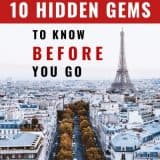
Hidden Gems: 10 Best Secret Views in Paris!
FOLLOW THE ADVENTURE ✈
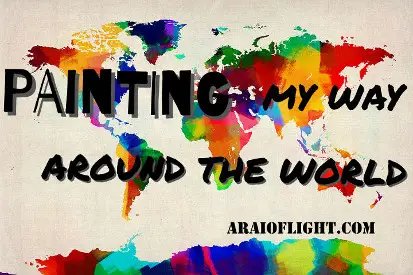
Conversation Questions Time
Time and world history.

25 time conversation questions
Time conversation questions.
Discussion questions on the topic of time for ESL speaking classes. This is an easy speaking topic that can be used with pre-intermediate level learners and above, The most challenging terms in this activity include – punctual, event, waste, patient, daylight savings, time zone, set (alarm), and kill time.
The time conversation questions are –
1 – How would you define time? Do you think that it can change speed?
2 – Do you think you have enough time to do the things you want to?
3 – Are you a punctual person? Are you usually early or late when you meet friends?
4 – Have you ever been very late for an important event? What happened?
5 – How many hours do you spend sleeping each day? Is it enough for you?
6 – How many times a day do you check the time?
7 – Have you ever missed a plane, train , or bus? Why were you late?
8 – Do you think time travel will ever be possible?
9 – Would you prefer to visit the future or the past? What year would you like to go to?
10 – What kinds of things make time feel like it is going slowly?
11 – What do you think has been the best time in your life?
12 – If you had 1 year of free time, what would you do with it?
13 – What kinds of things do you feel are a waste of time? Do you do them?
14 – Are you a patient person? What things do you dislike waiting for?
15 – Does your country have daylight savings or different time zones?
16 – Do you use an alarm clock? What time is it usually set for?
17 – If your friend was having a party at 8 pm, what time would you arrive?
18 – What would happen if you were 1 hour late to school or to work?
19 – How many hours a day do you spend cooking and eating?
20 – What is one change you could make in life to give yourself more time?
21 – If you had an extra 3 hours each day, how would you use them?
22 – How do you kill time when you are waiting for something or on a long journey?
23 – What takes up most of your time? Do you enjoy it?
24 – If you had the power to stop time, what would you do?
25 – What time do you think it is on the other side of the world right now?
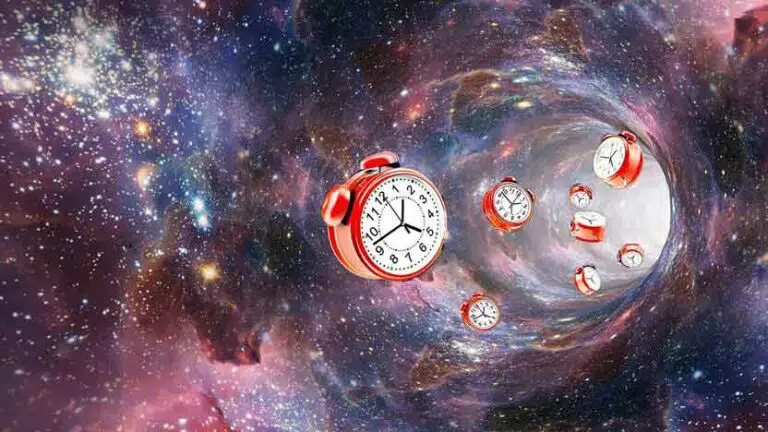
Time idioms and expressions
Here are some interesting idioms about time that you can share with your students once they have completed the time conversation questions.
When someone says it is “ time to call it a day “, they are saying it is time to stop working or finish whatever it is you are doing.
If you give someone a hard time , you either tease them for fun or treat them badly.
A person or thing that is living on borrowed time is not expected to live or survive for much longer.
The proverb – a stitch in time saves nine , means that if you do something now you will save time and effort in the future or prevent future problems from happening.
If you have a lot of time for someone , it means that you like them and enjoy their company.
You might also like these

25 police conversation questions
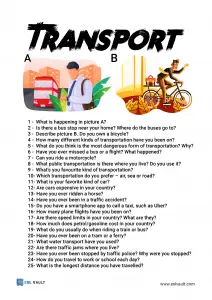
25 transport conversation questions
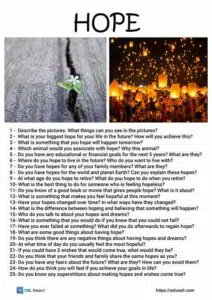
25 hope conversation questions
Free ESL and English teaching resources, no sign up required. Just find what you like, download it and head to class!
Privacy Policy
Share ESL Vault with your friends!
- Writing Worksheets
- Vocabulary Worksheets
- Pronunciation
- Kids worksheets
- Idioms and Expressions
- ESL Puzzles
- ESL Pair Work Activities
- ESL Conversation Questions
- Coloring Pages
- Articles, Lists and Ideas
- Art and Craft Activities
24 April 2024
Tales across time from the Plant Tree of Life
An ever-growing plant tree of life is the key to answering questions from 200 years ago and those of tomorrow.

By Sebastian Kettley and Ben Evans

Flowering plants are found across every corner of the Earth – from the steamiest tropics to the rocky outcrops of the Antarctic.
Their astonishing diversity, their ability to adapt and survive in the face of environmental change, and their usefulness to humans have made them a subject of study for thousands of years already.
A modern revolution in the study of DNA has allowed us to understand the evolution of this complex kingdom of life in more detail than ever before. Here we share the latest achievement: 1.8 billion letters of the DNA code sequenced from more than 9500 plant species, made available to use by anyone, anywhere, for free!
This huge piece of work published in Nature and forming part of Kew’s Tree of Life Initiative has brought together 279 scientists from 138 institutions and 27 countries under one cause – to sequence the DNA of as many flowering plants as possible and build a definitive plant tree of life stretching back to their origin.
The tree of life unlocks answers to questions posed centuries ago by early scientists including Darwin himself. It also helps us to solve puzzles and find solutions that will shape our planet in the years ahead.

Time travel partnership with 19 th century scientists
Advances in our ability to study ancient DNA has turned our collection of >8 million dried plant and fungal specimens into a remarkable time capsule.
The sandwort ( Arenaria globiflora ) specimen pictured below was collected almost 200 years ago in Nepal, and yet it has been possible to extract enough DNA to confidently place this species within the tree of life.
These early collectors had not even heard of DNA and could not have imagined the future use of their specimens. In a sense we are collaborating with botanists of the past to answer questions that they could scarcely have formulated.
This collaboration across time is even allowing us to learn about species that are already extinct and lost to us. For example, DNA extractions from a herbarium specimen of the extinct Guadalupe Island olive ( Hesperelaea palmeri ) have enabled us to shed light on the species’ evolutionary history, even though no living plant has been seen since 1875.

Solving Charles Darwin’s puzzles
In an 1879 letter to Joseph Dalton Hooker, his close confidant and at the time Director of RBG Kew, Darwin wrote
“ The rapid development as far as we can judge of all the higher plants within recent geological times is an abominable mystery. ”
From analysing the fossil record, Darwin was completely baffled by the rapid rise to dominance of flowering plants, a curiosity that he never had the chance to investigate in full. They account for ~90% of all known plant species today.
Incorporating more than 200 plant fossils into our new tree of life allowed us to explore the diversification of species as they arose across time. While most flowering plant lineages arose in the first boom period after the appearance of the first flowering plants over 140 million years ago, new evidence points to slower, and more stable rates of new species appearance for the next 100 million years, until a second surge in diversification took place around 40 million years before the present day.
This second flowering plant diversification likely coincided with a global decline in temperatures. These insights would have fascinated Darwin were he alive today, but in his place this information produced by the Tree of Life Initiative at Kew will feed countless studies by today’s scientists aiming to understand exactly how and why species diversify.

Tomorrow’s solutions today
Studying the tree of life is not just about looking into the past, but also the future.
Compare this tree of life to the periodic table of elements. Generally, you can point to an area of the periodic table and have a good idea of the properties of any element based on its location – for example, whether it’s solid or liquid at room temperature, or radioactive versus stable.
The tree of life works similarly. We can predict properties of certain plants based on what we understand about their most closely related species.
The potential in this is enormous. Imagine for example being able to explore for chemical compounds with potential use as medicines, based on those we’ve discovered so far.
A Kew project is already doing exactly this, utilising artificial intelligence in concert with the tree of life and chemical information to search for plants that might help us create new treatments for malaria – research that will be accelerated with new tree of life information.
We can also make more accurate predictions about how groups of plants are likely to fare under climate change, or how they might deal with certain plant diseases or pests, both of which are pressing questions that are getting hotter alongside our planet.

The Kew Tree of Life Explorer: for you, for all
This new tree of life is invaluable, but the impact it’ll have for our planet will only come from the people of all walks of life from around the world that make use of it.
That’s why together, the creators of the incredible dataset that underpins the Plant tree of life are making it free to use by all, via the Kew Tree of Life Explorer.
Whether it’s solving puzzles of the distant past or preparing for the world around the corner – we can’t wait to see what mysteries the plant tree of life will be used to solve next. What will you use it for?

Read the full open access publication
Phylogenomics and the rise of the angiosperms
Find out more about the plant tree of life

Kew Science
Completing the Plant Tree of Life
Discovering and disseminating the evolutionary history of all plant genera.

Scientists pass the halfway mark in completing the plant tree of life
Anyone can now freely access the genomic data for 55% of flowering plants
- Twitter page Twitter

ESL Conversation Questions
Questions That Will Make You Speak
20 ESL Conversation Questions about Time
- What time is it? Can you tell me the time?
- Are you good at guessing the time?
- Is time important to you?
- Do you sometimes waste your time? How?
- How can you spend your time wisely?
- What time do you get up every day? Do you have a routine?
- Do you think it is essential to wake up early every day? Why?
- What time do you go to bed? Do you stay late?
- Do you use a smartwatch? How is it different from analogue watches?
- Do you have enough free time? Would you like to have more free time? Why? What would you do if you had more free time?
- It is said that time is money. Do you agree with that? Why/Why not?
- If your close friend is wasting his/her time, would you advise him/her not to? How? Do you think they will listen to you?
- Are you good at timing/Are you on time or are you late everywhere?
- What takes up most of your time?
- How much time do you think a person should work in a day/week?
- If you could stop the time, what would you do? Why?
- Would you like to travel in time? Would you go back in time or go to the future?
- When do you think the time goes by slowly or quickly? Give some examples for each situation.
- If time travel were a possibility, would you change history? What would you change and why?
- Are you an organised person? Are you good at managing your time?
ESL discussion questions about the continued progress of existence.
Other topics you may be interested in...
General topics.
Air Travel , Animals , Appearance , Art , Childhood , Cinema , Crime , Eating Out , Education , Environment , Ethics , Fame , Family , Fashion , Food , Football (Soccer) , Friendship , The Future , Globalisation , Health , History , Holidays (Vacations) , House and Home , The Internet , Language , Language Learning , Life , Literature , Marriage , The Media , Money , Music , Personality , Politics , Religion , Romance , Science , Shopping , Smartphones , Sport , Technology , Time , Town and City , Transport , Travel , University , Video Games , War , Weather , Work .
Business Topics
Advertising , Brands , Building Relationships , Change , Communication , Competition , Consultants , Crisis Management , Cultures , Customer Service , Employment Trends , Ethics , First Impressions , Human Resources , International Marketing , International Markets , Job Satisfaction , Leadership , Management Styles , Marketing , Mergers and Acquisitions , Money , New Business , Online Business , Organisation , Project Management , Raising Finance , Risk , Strategy , Success , Team Building , Training , Travel .
Grammar Topics
Present Simple , Present Continuous , Present Perfect , Present Perfect Continuous , Past Simple , Past Continuous , Used to , Have to , Going to / Pres. Continuous , Going to / Will , Comparatives , Superlatives , First Conditional , Second Conditional , Third Conditional , Mixed Conditionals , Should , Should have , Can , Could , Can / Could / Be able to , Is done / Was done , Being done / Been done .
How to use the time ESL discussion questions
It is recommended that you download the time ESL discussion questions in PDF format using one of the links above. The best way to encourage classroom interaction is to download and print the time discussion questions in the 'pairs' or 'threes' PDF format and then divide the questions by cutting along the dotted lines. This allows students to take turns asking and answering the time discussion questions in groups of two or three. Alternatively, you could use the 'cards' format to distribute the questions to any number of students to ask and share.
It is advisable to prepare students for using these discussion questions by first introducing them to the topic of time in an interesting and engaging way. An anecdote, quiz question or a related image or video could all be used to achieve this. Depending on the level, it may also be necessary to pre-teach any challenging vocabulary related to time contained in the discussion questions.
For more ESL discussion questions, see this site's main page. There are discussion questions on a range of topics including general, grammar and business English topics.
For further information about the site and its author, see the about page.
Screen Rant
How the delorean time travelled without going 88mph in back to the future 2.
Doc Brown's DeLorean had to reach 88 MPH to travel through time, but at the end of Back to the Future Part 2, it looked as if the rules were changed.
Back to the Future Part 2 seemed to break its own rule, allowing the DeLorean to time travel without reaching 88 MPH, but it turns out this isn't a pothole after all. Naturally, the beloved science fiction franchise is full of such questions and mysteries, and it often takes a bend of the imagination to make everything make sense. Whenever time travel gets involved, there are sure to be some paradoxes. However, in the case of Doc's jump to 1885 at the end of Back to the Future Part 2 , there is a perfectly reasonable explanation.
By the end of the second Back to the Future movie , Marty and Doc had become pretty familiar with the ins and outs of time travel. They jumped back to 1955, returned to 1985, traveled to 2015, and repeated this cycle several times before a final trip back to 1955. From here, The pair were ready to finally head back to their true time, 1985, once and for all. However, just as Doc and his flying DeLorean were about to return to the ground and pick up Marty, the time-machine car was struck by lightning and sent to 1885 . The problem is, the DeLorean wasn't traveling at the requisite 88 MPH when it jumped.
Back To The Future: All 8 Timelines In The Movies Explained
The delorean reached 88 mph thanks to being struck by lightning in back to the future 2, the delorean traveled at 88 mph in a rapid loop-de-loop.
The problem regarding the stationary DeLorean being sent back in time was spotted relatively quickly after Back to the Future Part 2 was released in 1989, and it has plagued many ever since. It was clear that the time machine still needed to get up to 88 MPH since Marty and Doc had to use a steam engine to get it up to speed at the end of Back to the Future Part 3 . So, the change didn't come down to upgrades made to the DeLorean in 2015 (which eliminated the need for plutonium after the first Back to the Future ). As it turns out, the answer is pretty simple.
The DeLorean did get up to 88 MPH. In fact, it likely traveled much faster than that.
According to Back to the Future creator Bob Gale , the DeLorean did get up to 88 MPH. In fact, it likely traveled much faster than that. When the car was struck by lightning while flying in the air, the vehicle was sent spinning on its axis . It looped around so quickly that the required speed was achieved, and between this and the power of the bolt of lighting (or perhaps Mr. Fusion), the DeLorean's time-traveling capabilities were activated. Of course, it all happened so quickly that Marty (and the audience) could barely see it. Still, there was clear evidence of this sudden loop-de-loop.
The Backwards 99 At The End Of Back To The Future 2 Explained
The mysterious number in back to the future part 2 didn't have a secret meaning after all.
Gale's answer about how the DeLorean got up to 88 MPH makes perfect sense when remembering the mysterious backward 99 that appeared in the sky in Back to the Future Part 2 . This number became the inspiration for a wide variety of fan theories. Some believed the number referred to different points where Doc and Marty had already traveled in time. The number nine was visible on street signs in both 1955 and 2015, and the backward 99 might have referred to Doc going backward in time. However, the truth is much simpler.
As previously explained, the DeLorean was thrown into a rapid loo-de-loop after it was struck by lightning, and since the speed was beyond 88 MPH, the car went back in time. Whenever the time machine jumped before this, fiery tire marks were left in its wake. Of course, this wasn't quite possible at the end of Back to the Future Part 2 since the DeLorean was flying in the air. So, the fiery tread marks were left floating in the sky instead. The backward 99 was just the visible path the car had taken to get up to speed after being struck.
Why The DeLorean Sends Doc Brown Back To 1885
A malfunction was responsible for kicking off back to the future part 3.
Another mystery connected to the DeLorean's spontaneous jump is why Doc traveled back to 1885 when the car was set to go forward to 1985. This was subtly answered moments before lighting struck at the end of Back to the Future Part 2 when Doc gave the time circuits a good old-fashioned punch to set them right again. Since they had been malfunctioning only moments before, it's no great surprise that a jolt of lightning would cause the dial to change from 1985 to 1885. Of course, without the letter that Doc arranged to be delivered to Marty, no one would have known precisely where he ended up.
Back to the Future Part II
*Availability in US
Not available
Taking up where the first movie left off, Back to the Future Part II sees Marty McFly and Doc Brown travel to the year 2015, where their efforts to fix the future end up causing even bigger problems as Biff Tannen wreaks havoc across the timeline with the help of a stolen sports almanac. Martin J. Fox and Christopher Lloyd return in Robert Zemeckis and Bob Gale's second installment of their iconic trilogy.
AITC Immunization & Travel Clinic
We provide travel health visits, vaccinations, TB testing, and blood tests. Appointment only.
Attention! starting April 15, 2024
Our new website address is SF.GOV/AITC

AITC Services, Price, and Forms
Book an appointment on line and get clinic forms
See our services and prices
Donate to AITC
Welcome to AITC
AITC is a non-profit clinic that is part of the San Francisco Department of Public Health (SFDPH). As public health providers, our mission is to prevent disease and protect the health of all.
We are open to the public, and serve all members of the community, including:
- Teens and adults seeking recommended vaccinations
- School age children needing vaccines required for school
- Adults who need vaccines for work or school
- Immigrants to the US requiring vaccines for Change of Status
- Individuals and families planning international travel
Our services are by appointment only.
AITC is unable to accept insurance. Fees must be paid at the time of service. Low-cost or free services are available to those who qualify.
Message about our MPOX vaccine (JYNNEOS) supply
Mpox vaccine at AITC is still supplied free of charge by the government. Later in 2024 we may need to purchase the vaccine and charge a fee for it. We will post more information when it becomes available.
Getting here
Metered street parking or Civic Center Garage
Public transportation
Southwest corner, Civic Center Plaza Across from City Hall BART / MUNI : Civic Center Station
Make an appointment online by clicking the left link. It is highly recommended; it is simpler and faster.
If you need assistance, please call us.
AITC Immunization & Travel Clinic
Mon to Fri, 9:00 am to 4:00 pm Closed for lunch 12 pm - 1pm
We are closed weekends and holidays .
Find more information about how to get to our clinic .
Departments
Hamas terrorism and US antisemitism cast shadow over Passover for American Jews
A society that turns the other cheek in the face of those who persecute jews, because they are jews, will ultimately lose their freedoms for all..
Jews will gather Monday for the Passover Seder as we have for centuries. Children are taught to ask four questions with the opening, “Why is this night different from all other nights?” But this year, there is a fifth question American Jewish families will ask at their Seder table: “What is our place today in America?”
This year, Jews will celebrate Passover in the shadow of Hamas’ Oct. 7 attack on Israel − the bloodiest day for Jews since the Holocaust − and amid the largest surge in antisemitism ever in the United States.
As we celebrate our freedom from Egypt, we will think about the Jews who are hostages in Gaza, taken captive solely because they are Jews. We will cry as we retell the biblical-era atrocities against our ancestors that rhyme with the brutality of our present-day foes.
For American Jews, our current anxiety is not only out of concern for our Israeli brothers and sisters. It also is because we are shocked by those who have taken to the streets to praise Hamas and denounce Jews.
Unprecedented “protests” have been mounted outside synagogues , and Jewish-owned businesses have been vandalized . And of course, there is the over-the-top animus on university campuses , where Jewish students and faculty are harassed and threatened without consequence to the perpetrators.
Our shared humanity: My students rioted after I said, 'I stand with Israel.' Here's how we came together after.
New questions will be asked at this year's Passover Seder
In this context, in this moment, every American Jewish family will ask at their Seder table: “Is the golden age of American Jewry over?” A teenager will turn to a grandparent and ask: “Are we watching a replay of 1930s Germany here?”
These questions will be asked by Orthodox Jews, who are acutely tuned to the patterns of Jewish history, which tells of “golden ages” that have come and gone for centuries.
And these questions will be asked by liberal Jews, who might have reservations about how Israel has prosecuted its war against Hamas but have even greater reservations about their erstwhile friends and colleagues siding with Hamas.
These Jews have fought on the front lines of many progressive causes − for racial, economic, women’s, LGBTQ+ and other rights. Now, they find themselves abandoned by alleged allies when it was time to stand against Jews being victims of rape and murder.
We thought our son was alive. Release Hamas hostages and spare others our pain.
While the Haggadah provides answers to the four traditional Passover questions, it leaves this question of this moment unanswered. That answer will depend on the American people and how we, collectively, right our course and respond to this decisive moment in American Jewish history.
But the Passover story makes one thing clear: In the age-old fight between good and evil, good will triumph.
There’s a reason the Passover Seder is the most observed Jewish ritual across the full spectrum of Jews. It holds a message of promise that the Jewish people will endure in the face of unimaginable evil. Great empires − Greek, Roman, Ottoman and British − have come and gone, but we Jews remain.
Non-Jews gravitate toward the Passover story for the same reason. Indeed, Exodus makes a frequent cameo in America’s founding story. In 1776, Ben Franklin proposed a national seal with the image of “Moses standing on the shore, and extending his hand over the sea” with the motto “Rebellion to Tyrants is Obedience to God.”
From the abolitionist era to the Civil Rights Movement, the idea of people being delivered from servitude to freedom captured the American imagination.
Americans can stand with Jews against evil and tyranny
Today, Americans have an opportunity to side with good and freedom over evil and tyranny. A society that turns the other cheek in the face of those who persecute Jews, because they are Jews, will ultimately lose their freedoms for all.
From university administrators to the White House to the average man on the street, this is a decisive moment for all of us. Our choice as a country will not only determine what happens to the Jewish people, but what happens to the American people as well.
Nathan J. Diament is executive director of Public Policy for the Union of Orthodox Jewish Congregations of America .

IMAGES
VIDEO
COMMENTS
As a result, a multitude of questions have arisen regarding the possibilities and consequences of time travel. In this article, we will explore some of the most thought-provoking time travel questions that have intrigued people throughout history. See these time travel questions. Is time travel possible? What are the different theories of time ...
If you enjoyed these 43 Terrific Time Travel Writing Prompts …. please share them on Facebook, Twitter, and/or Pinterest. I appreciate it! These 3 lists of terrific time travel prompts will help writers of all ages write about traveling through time in their stories or just for fun. Take a look!
If time travel is allowed by the laws of physics, ... How It Works has a special formula for making learning fun by answering questions on science, space, history, technology, transport and the ...
Time Travel ESL Speaking Questions. B1 and B2 Level Speaking - Time Travel ESL Speaking. Have you seen any time traveling movies? Suggestions: The Girl Who Leapt Through Time - Anime, Back to the future, Edge of tomorrow, Bill and Ted's Excellent Adventure. Do you think that people will achieve time travel in the future?
The Milky Way over Alberta, Canada. If you want to travel far into the future, says Rovelli, 'it is sufficient to build a fast starship, travel fast enough back and forth, and in a few days (of ...
Time Travel. First published Thu Nov 14, 2013; substantive revision Fri Mar 22, 2024. There is an extensive literature on time travel in both philosophy and physics. Part of the great interest of the topic stems from the fact that reasons have been given both for thinking that time travel is physically possible—and for thinking that it is ...
CONVERSATION: Time Travel Questions. Sirius had some questions for us—and you—about time travel stories. This discussion will run in two parts, with today's focusing on the questions below and Monday's reserved for discussing Outlander and for our book recommendations. -Janine.
Time traveling to the near future is easy: you're doing it right now at a rate of one second per second, and physicists say that rate can change. According to Einstein's special theory of ...
Time travel - 6 ESL English Discussion Questions. Leave a Comment / English Speaking / By Mouhcine Mitallan. Here are 6 Conversation Questions about the topic of " Time travel ": 1- Have you ever seen any time traveling movies? Was the concept structured logically? 2- Do you think that one day people will be able to travel in time? Why ...
60 Travel Conversation Questions. Instead of having a long list of travel conversation questions, it is better to have them categorized to make everything easier. These are 60 travel conversation questions that have been divided into different categories such as: #1. Places. #2.
Frequently Asked Questions About Time Travel: Directed by Gareth Carrivick. With Chris O'Dowd, Marc Wootton, Dean Lennox Kelly, Anna Faris. While drinking at their local pub, three social outcasts attempt to navigate a time-travel conundrum.
Breaking News English.com - A FREE 20 Questions activity on Time Travel. Comes with more reading, activities, quizzes and a listening.
Explore the latest questions and answers in Time Travel, and find Time Travel experts. Questions (35) Publications (5,333) Questions related to Time Travel. Alexander Ohnemus.
Travelling the world is a dream for many, myself included.I quit my job in 2012 to travel and have been living out of a suitcase ever since. A countless number of adventures and an immeasurable number of conversations later, I think back on all the questions I've been asked through it all by fellow travellers I have met along the way as well as friends back home.
Questions about traveling: If you could…. The next questions about traveling use a particular structure. We use "if you could" to talk about things or wishes that are unreal - but we'd really like to do. For instance, I'd really like to speak 7 languages fluently! If you could travel back in time, which historical era or event would ...
The travel conversation questions on worksheet 1 are - 1 - When was the last time you traveled? Where did you go? 2 - What is your favorite thing about traveling? 3 - Where would you like to travel to next? When do you think you will go there? 4 - How long can you travel before you start to miss home? 5 - What are the most important things to pack before you go traveling?
Conversation Questions. Time. A Part of Conversation Questions for the ESL Classroom . Are you on time? If you are late, what message does this send to the person who is waiting for you? Do you prefer to show up late or early? What is your busiest day of the week? Do you like to be busy, or do you like to have an easy schedule?
Discussion questions on the topic of time for ESL speaking classes. This is an easy speaking topic that can be used with pre-intermediate level learners and above, The most challenging terms in this activity include - punctual, event, waste, patient, daylight savings, time zone, set (alarm), and kill time.
Questions tagged [time-travel] Ask Question. Time travel is the concept of moving between different points in time, often instigated by non-trivially topology of space-time, such as a wormhole. DO NOT USE THIS TAG for questions on changes of coordinate systems, changes of time coordinate, or topologically trivial 'twin paradox' settings.
An ever-growing plant tree of life is the key to answering questions from 200 years ago and those of tomorrow. ... Time travel partnership with 19 th century scientists. Advances in our ability to study ancient DNA has turned our collection of >8 million dried plant and fungal specimens into a remarkable time capsule. ...
It is said that time is money. Do you agree with that? Why/Why not? If your close friend is wasting his/her time, would you advise him/her not to? How? Do you think they will listen to you? Are you good at timing/Are you on time or are you late everywhere? What takes up most of your time? How much time do you think a person should work in a day ...
The best way to encourage classroom interaction is to download and print the time discussion questions in the 'pairs' or 'threes' PDF format and then divide the questions by cutting along the dotted lines. This allows students to take turns asking and answering the time discussion questions in groups of two or three.
Whenever time travel gets involved, there are sure to be some paradoxes. However, in the case of Doc's jump to 1885 at the end of Back to the Future Part 2, there is a perfectly reasonable explanation. By the end of the second Back to the Future movie, Marty and Doc had become pretty familiar with the ins and outs of time travel. They jumped ...
A torrent of rain on Tuesday flooded parts of Dubai, turned streets into rivers and shut down the world's second-busiest airport for a time. The deluge of water triggered the question: Was this ...
Hit movies and series including The Time Machine, Interstellar, the German series Dark, the Back to the Future franchise, Marvel's Doctor Strange and Loki, 13 Going 30 and About Time are some prime examples across diverse genres experimenting with time travel.. Similarly, time travelling in the anime world, where characters experiment and play with the clock and its consequences, is regarded ...
Fees must be paid at the time of service. Low-cost or free services are available to those who qualify. Message about our MPOX vaccine (JYNNEOS) supply. ... AITC Immunization & Travel Clinic 101 Grove Street, Room 102 San Francisco, CA 94102. Mon to Fri, 9:00 am to 4:00 pm Closed for lunch 12 pm - 1pm. Get directions.
$300 annual travel credit for Capital One Travel bookings 10,000-mile anniversary bonus every year beginning on your first anniversary Free access to Capital One Lounges and select partner airport ...
New questions will be asked at this year's Passover Seder. In this context, in this moment, every American Jewish family will ask at their Seder table: "Is the golden age of American Jewry over ...
Updated April 19, 2024 10:52 am ET. Share. Text. Israel retaliated overnight against Iran's massive drone and missile attack on its territory, people familiar with the matter said—with what ...
China will send giant pandas to live at San Francisco's zoo for the first time, Mayor London Breed has announced. ... Travel Destinations ... Frequently Asked Questions Top 20 Shops